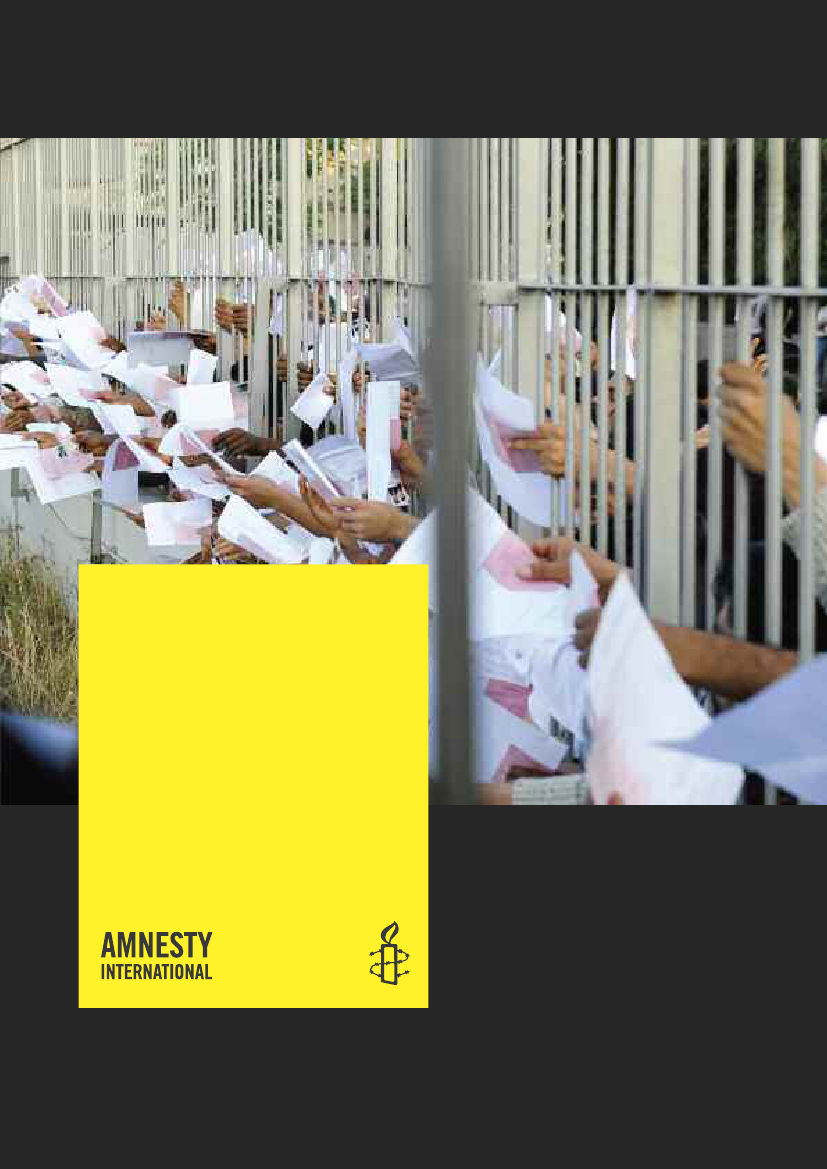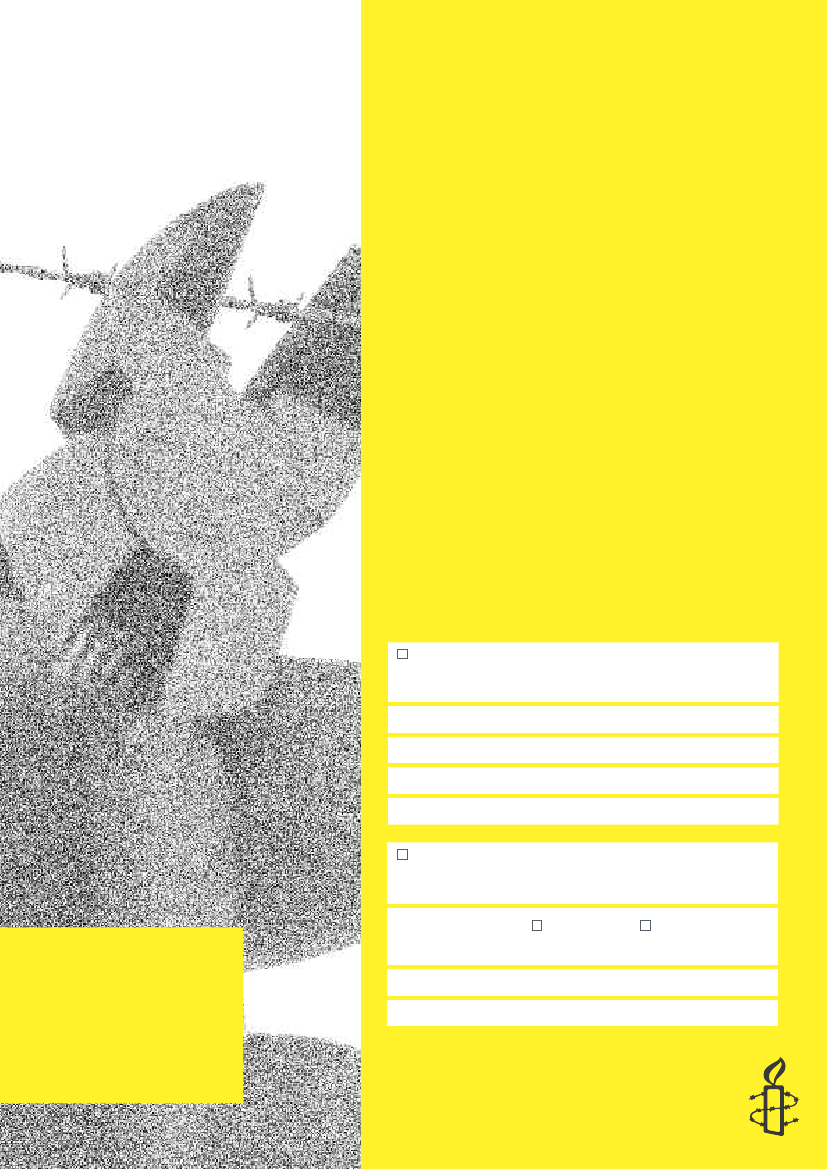Udvalget for Udlændinge- og Integrationspolitik 2010-11 (1. samling)
UUI Alm.del Bilag 49
Offentligt
TRANSFERS OFASYLUM-SEEKERSTO GREECE
THE DUBLIN IITRAP
Amnesty International is a global movement of 2.8 million supporters, members andactivists in more than 150 countries and territories who campaign to end grave abusesof human rights. Our vision is for every person to enjoy all the rights enshrined in theUniversal Declaration of Human Rights and other international human rights standards.We are independent of any government, political ideology, economic interest or religionand are funded mainly by our membership and public donations.
Amnesty International PublicationsFirst published in 2010 byAmnesty International PublicationsInternational SecretariatPeter Benenson House1 Easton StreetLondon WC1X 0DWUnited Kingdomwww.amnesty.org� Amnesty International Publications 2010Index: EUR 25/001/2010Original language: EnglishPrinted by Amnesty International,International Secretariat, United KingdomAll rights reserved. This publication is copyright, butmay be reproduced by any method without fee for advocacy,campaigning and teaching purposes, but not for resale.The copyright holders request that all such use be registeredwith them for impact assessment purposes. For copying inany other circumstances, or for re-use in other publications,or for translation or adaptation, prior written permission mustbe obtained from the publishers, and a fee may be payable.Cover photo:Asylum-seekers waiting to submit their asylumapplications at the entrance of the Police Asylum Departmentof the Aliens Directorate, Headquarters of Hellenic Police, inPetrou Ralli, Athens, June 2009.� Nikolas Kominis – Studio Kominis
CONTENTSGlossary .......................................................................................................................41. Introduction .............................................................................................................52. Research methodology...............................................................................................83. Background information.............................................................................................93.1. The Dublin II system ...........................................................................................93.2. Recent reports and actions on Greece ...................................................................94. Dublin II returns to Greece: Detention, Refugee status determination, and risk ofrefoulement................................................................................................................114.1 Detention at Athens airport .................................................................................114.2. Difficulties in lodging asylum applications...........................................................154.3. Lack of an impartial and specialized decision-making authority .............................184.4. Lack of thorough interviews and examinations of claims........................................194.5. Lack of interpretation services............................................................................214.6. Administrative barriers to accessing the asylum system due to homelessness ..........234.7. Limited access to legal assistance ......................................................................254.8. The right to an effective appeal ..........................................................................275. Expulsions and the principle ofnon-refoulement.......................................................306. Economic and social rights of asylum-seekers transferred to Greece .............................356.1. Access to Accommodation .................................................................................366.2. Access to health care ........................................................................................397. Conclusion .............................................................................................................428. Recommendations ..................................................................................................43
4
THE DUBLIN II TRAPTRANSFERS OF ASYLUM-SEEKERS TO GREECE
GLOSSARYConvention against TortureCPTECHRConvention against Torture and Other Cruel, Inhuman orDegrading Treatment or PunishmentEuropean Committee for the Prevention of Torture andInhuman or Degrading Treatment or PunishmentEuropean Convention for the Protection of HumanRights and Fundamental Freedoms (EuropeanConvention on Human Rights)European Court of JusticeEuropean Council on Refugees and ExilesEuropean Court of Human RightsEuropean UnionGreek Council of RefugeesInternational Covenant on Civil and Political RightsInternational Covenant on Economic, Social andCultural RightsMedical Rehabilitation Centre for Torture VictimsMédecins sans frontièresNon-Governmental OrganizationPresidential Decree1951 Convention relating to the Status of RefugeesRefugee status determinationUnited Nations High Commissioner for Refugees (UNRefugee Agency)
ECJECREECtHREUGCRICCPRICESCRMRCTVMSFNGOPDRefugee ConventionRSDUNHCR
Amnesty International March 2010
Index: EUR 25/001/2010
THE DUBLIN II TRAPTRANSFERS OF ASYLUM-SEEKERS TO GREECE
5
1. INTRODUCTIONAmnesty International is concerned that state parties to the European Union (EU) DublinRegulation continue or have resumed the return of asylum-seekers under this Regulation1toGreece despite continuing serious concerns with regard to the treatment of asylum-seekers,refugees and migrants in Greece. The Dublin Regulation is an EU law for determining whichmember state is responsible for deciding an asylum application lodged within the EU,2andusually requires that asylum-seekers be returned to the first country they entered uponarriving in the EU. Individuals transferred under the Dublin II system3face a myriad of risksto their human rights in Greece, including most seriously a risk ofrefoulementthroughfailures in the asylum system at both procedural and substantive levels. As this report willhighlight, these failings are: difficulties in accessing the asylum system and registering aclaim; unfair examinations of asylum claims; a lack of procedural safeguards as required byinternational law to ensure the correct identification of those in need of internationalprotection, and to prevent violation of the principle ofnon-refoulement.4These proceduralfailings include the abolition of a substantive appeal, and a lack of legal counselling,interpretation and information about the asylum procedure. On top of these systemic failings,expulsions to Turkey, including of asylum-seekers, are creating further risks of indirect orchainrefoulement.5In addition, the vast majority of asylum-seekers transferred under theDublin Regulation are automatically detained in inadequate conditions at the airport upontheir arrival in Greece. Elsewhere in the country reception conditions fall far short of requisitestandards, and economic and social rights are not met. In view of these findings, AmnestyInternational must repeat its call to state parties to the Dublin Regulation to immediatelysuspend all transfers to Greece under the Regulation until such time as reforms areimplemented ensuring that requisite levels of human rights protection are met for refugeesand asylum-seekers in Greece.During 2007/8, in response to growing concern about the dire asylum conditions in Greeceexpressed by, among others, the UN Refugee Agency (UNHCR), the Commissioner for HumanRights of the Council of Europe and various non-governmental organizations (NGOs), anumber of European countries took steps to suspend or reduce Dublin II transfers to Greece.Given the evidence of serious continuing problems outlined in this report it is therefore ofsignificant concern that, since the first half of 2009, some state parties to the DublinRegulation, including Finland, the Netherlands, Belgium and Norway, which were previouslycircumspect in or had suspended applying the Regulation, have resumed returns of asylum-seekers to Greece.6European countries commonly argue that if breaches of human rightstake place in Greece then individuals can seek redress there since Greece is a party to therelevant human rights conventions and treaties. However, Amnesty International and otherorganizations have repeatedly raised concerns about the obstacles faced by individuals inaccessing their rights or effective remedies in practice.Since March 2008, Amnesty International has called upon EU member states to make use ofthe sovereignty clause under Article 3.2 of the Dublin Regulation.7This allows a state toexamine an asylum claim, even if such examination is not its responsibility under the criteriaof the Regulation, including to avoid transferring asylum-seekers to the state which is
Index: EUR 25/001/2010
Amnesty International March 2010
6
THE DUBLIN II TRAPTRANSFERS OF ASYLUM-SEEKERS TO GREECE
responsible until that state guarantees access to a fair asylum procedure and adequatereception conditions in compliance with international human rights law and standards as wellas EU law.8In April 2008, UNHCR advised EU member states to refrain from returning asylum-seekers toGreece under the Dublin Regulation until further notice. This advice was based on concernsregarding the access to and quality of the Greek asylum procedure, the fact that thereception conditions continued to fall short of international and European standards, and theundue hardships faced by asylum-seekers, including “Dublin returnees”, in having theirclaims heard and adequately adjudicated. UNHCR’s view was that a combination of thesefactors may give rise to the risk ofrefoulement.In December 2009 the UN Refugee Agencyissued an updated report in which it stated that it “continues to advise Governments torefrain from returning asylum-seekers to Greece under the Dublin Regulation or otherwise”.9Amnesty International’s research findings indicate that the situation for asylum-seekers whoare returned to Greece has not improved since it called upon the EU member states not totransfer asylum-seekers to Greece. Concerns relate to both the Presidential Decree (PD) No.90/2008 of July 2008 (which transposed the EU Asylums Procedure Directive) and theamending PD No. 81/2009 of July 2009. Indeed, the situation has worsened with theadoption of PD 81/2009, which abolished the second stage of asylum procedures, leavingasylum-seekers with no recourse to an effective appeal. An asylum-seeker whose applicationhas been rejected may only apply to the Council of State for annulment of that decision.According to UNHCR, the adoption of this new legislation has introduced changes to theasylum procedure “which have further diminished the prospects of asylum-seekers, includingDublin II transferees, having their claims determined in a fair procedure in Greece”.10Moreover, the detention conditions in which people returned to Greece are held at Athensairport, particularly vulnerable individuals such as children, as well as the small number ofreception facilities for asylum-seekers, raise serious concern.This report assesses transfers of asylum-seekers to Greece under the Dublin Regulationagainst the legislation and practices of the authorities in recent years. Although Greece hasformally transposed relevant EU asylum legislation, Amnesty International’s research hasfound that this legislation as well Greece’s obligations under wider international law are notbeing complied with in practice.Greece, as a state party to the 1951 Convention relating to the Status of Refugees (RefugeeConvention) and its Protocol as well as other relevant instruments, including the InternationalCovenant on Civil and Political Rights (ICCPR), the Convention against Torture and OtherCruel, Inhuman or Degrading Treatment or Punishment and the European Convention for theProtection of Human Rights and Fundamental Freedoms (ECHR), must ensure that it doesnot breach the principle ofnon-refoulement.11Amnesty International reiterates that, in orderto meet this obligation, and as required by international standards, Greece must giveindividuals within its jurisdiction12and seeking international protection access to an asylumdetermination system with full procedural safeguards.In 2007, out of 20,684 asylum applications examined at first instance, only eight applicants(0.04 per cent) were granted asylum; out of 6,448 applications examined on appeal, refugee
Amnesty International March 2010
Index: EUR 25/001/2010
THE DUBLIN II TRAPTRANSFERS OF ASYLUM-SEEKERS TO GREECE
7
status was granted in 132 cases (2.05 per cent).13In 2008 out of 29,573 applications,refugee status was granted in 14 cases (0.05 per cent) in the first instance, and 344applications for asylum were granted out of 3,342 applications examined in the secondinstance (10.29 per cent).14According to the statistics provided to UNHCR by the Ministry ofInterior, in the first seven months of 2009 approximately 20,000 asylum applications(19,640 at the first instance, 810 at the second instance) were examined, of which 20asylum claims were granted. Over the same period, 24 asylum-seekers were grantedhumanitarian status (including those whose status was renewed), while 61 receivedsubsidiary protection (under PD 90/2008). Amnesty International considers that theserecognition rates are disturbingly low.Amnesty International believes that in view of current huge divergences in the quality of EUmember states’ asylum systems coupled with the absence of an automatic suspensive right ofappeal against Dublin II transfers where the safety of a receiving state is questioned, thecurrent Dublin system places individuals at risk ofrefoulement.In this regard, amendmentsto the Dublin Regulation proposed by the European Commission in December 2008 toprovide effective remedies against transfers and to introduce a temporary suspensionmechanism are to be welcomed.15However, pending revision of the Dublin system, there isan urgent need to ensure that arrangements for returning asylum-seekers under the DublinRegulation comply with the obligations of EU member states under international law,particularly where these obligations apply to vulnerable groups, the maintenance of familyunity and the protection of asylum-seekers fromrefoulementor other human rights violations.At the end of 2009 the newly elected Greek government publicly acknowledged a number ofproblems in the current asylum system in Greece and announced that changes were neededto the asylum determination procedure. Among the plans announced were the removal ofdecision-making powers on asylum applications from the police and the establishment of aCentral Asylum Service as the authority determining asylum applications at first instance.16In addition, it was announced that until more substantial changes came into effect theexisting legal framework (PD 81/2009) should immediately be improved so that asylum-seekers can receive better and faster assistance. A Committee of Experts, comprising ofrepresentatives of the UNHCR and national NGOs, was established to prepare proposals onthe issues concerned. Draft new legislation on asylum determination procedures isanticipated in March.While Amnesty International welcomes the acknowledgement of current failings and proposednew measures, any such measures will need to comprehensively address all of the issueshighlighted in this report. Furthermore the real test will be in the implementation of any newmeasures. Amnesty International remains concerned that even if new and improvedlegislation is introduced, the practice may remain inadequate and will require carefulmonitoring before Greece is considered to have a fair asylum procedure.
Index: EUR 25/001/2010
Amnesty International March 2010
8
THE DUBLIN II TRAPTRANSFERS OF ASYLUM-SEEKERS TO GREECE
2. RESEARCH METHODOLOGYBetween September 2008 and October 2009, Amnesty International representatives carriedout fact-finding visits and conducted interviews in Athens, Patras, Lavrio, Thessaloniki, Crete,Igoumenitsa, Konitsa and the Evros area. They spoke to: refugees, asylum-seekers andirregular migrants as well as government authorities, intergovernmental agencies, NGOs andlawyers working with asylum-seekers; and representatives of embassies of EU member states.Amnesty International was given access to the detention facilities in Athens airport whereDublin II returnees are often detained upon their return to Greece. Amnesty International alsovisited detention facilities in Evros, Igoumenitsa and Patras, where asylum-seekers as well asirregular migrants are detained; shelters for child asylum-seekers in Crete and Konitsa; andresidential centres for asylum-seekers in Lavrio and Thessaloniki. In the course of thesevisits, although the organization focussed particularly on the plight of Dublin II returnees, italso collected information about the asylum system in Greece as a whole. AmnestyInternational continued to collect information until February 2010.Amnesty International wishes to thank all the individuals and organizations that assisted inthe research and provided information, particularly the asylum-seekers who agreed to beinterviewed.Amnesty International interviewed 51 asylum-seekers – 44 men and seven women – who hadbeen transferred to Greece from other states (Germany, Iceland, UK, the Netherlands,Sweden, Belgium, Austria, Denmark, Switzerland and Cyprus). Their countries of originincluded Afghanistan, Armenia, Iran, Iraq, Somalia and Sudan. Three of the male asylum-seekers said they were minors, in spite of their asylum application cards recording them asadults. Four of the asylum-seekers had been transferred with children aged between fivemonths and 17 years. The first transfer documented took place in 2002, the last in January2010. Care has been taken to avoid the inclusion of information that could reveal the identityof the asylum-seekers interviewed in order to respect confidentiality, and to ensure that anyinformation provided does not prejudice their ongoing asylum proceedings.
Amnesty International March 2010
Index: EUR 25/001/2010
THE DUBLIN II TRAPTRANSFERS OF ASYLUM-SEEKERS TO GREECE
9
3. BACKGROUND INFORMATION3.1. THE DUBLIN II SYSTEM…at the level of implementation, it has become evident that asylum applications areassessed differently in similar situations.Dutch State Secretary for Justice Nebahat Albayrak17
Since 1999 the European Union has been working to create a Common European AsylumSystem (CEAS) with common asylum procedures and uniform status for refugees throughoutthe EU. The first phase of the system was completed in 2005 with the adoption of a set offour main legal instruments: the Dublin Regulation, the Reception Conditions Directive,18theQualification Directive19and the Asylum Procedures Directive.20These directives provideminimum standards for the treatment of asylum claims in the EU but in practice have not yetbeen fully implemented by all member states.21The second phase is now underway,including recast proposals to amend the above instruments, with the stated intention ofcompleting the CEAS by 2012.The Dublin Regulation is premised on the assumption that there are equivalent standards ofprotection in all EU member states. However, practices and refugee recognition rates differwidely between the member states resulting in what amounts to a lottery for asylum-seekersarriving in the EU. This fundamentally calls into question the fairness of the Dublin IIsystem.
3.2. RECENT REPORTS AND ACTIONS ON GREECEOver recent years many organizations have reported on the deplorable treatment of asylum-seekers in Greece. In its 2005 report,Out of the Spotlight: The rights of foreigners andminorities are still a grey area,22Amnesty International highlighted the failure of the Greekgovernment to comply with human rights law and standards regarding access to asylumprocedures, the detention of migrants and their protection from discrimination and ill-treatment. Since 2008, a succession of further reports have been provided by, among others,UNHCR,23the Council of Europe,24Pro Asyl,25and Human Rights Watch.26Key concernsidentified included: a lack of procedural safeguards and access to the asylum procedure;arbitrary detention often in inadequate detention conditions; a lack of proper receptionconditions; and the low recognition rate of refugees and those in need of other forms ofprotection. Further impediments to those seeking asylum, such as the effective removal of asubstantive appeal right, have arisen from the adoption of PD 81/2009. The Pro Asyl, HumanRights Watch and UNHCR reports also refer to cases in which Greek coastguards have forcedasylum-seekers back to Turkey or conducted unlawful expulsions at the border.On 31 March 2008 the European Commission initiated an infringement procedure againstGreece before the European Court of Justice (ECJ). According to the Commission, Greecefailed to adopt the laws, regulations and administrative measures necessary “to ensure, inevery case, examination of the merits on applications for asylum of third-country national who… are transferred to Greece”,27as provided for in the Dublin Regulation.28On 22 October
Index: EUR 25/001/2010
Amnesty International March 2010
10
THE DUBLIN II TRAPTRANSFERS OF ASYLUM-SEEKERS TO GREECE
2008 this procedure was withdrawn as a result of legislative changes introduced by Greece intransposing the EU Asylum Procedures Directive.29However, due to ongoing concerns aboutimplementation in practice and the new July 2009 legislation on the asylum procedure, inNovember 2009, the Dutch Refugee Council, Pro Asyl, the British Refugee and MigrantJustice and the Finnish Refugee Advice Centre filed a complaint with the EuropeanCommission against Greece, concerning the country’s failure to comply with EU law.30Amnesty International Greece, among other bodies, including the National Commission forHuman Rights31and the Greek Council for Refugees, also submitted a complaint to theEuropean Commission in November 2009. The complaint argued that PD 81/2009,amending PD 90/2008, is incompatible with Article 39 of the Asylum Procedures Directive.Although PD 81/2009 permits asylum-seekers rejected at first instance to submit anapplication for annulment before the Council of State, it does not qualify as an effectiveremedy since the Council of State can only examine the legality of the administrative rulingrejecting an asylum application at first instance, and not the substantive merits of a claim.On 3 November 2009, the European Commission sent Greece a letter of formal notice, whichconstitutes the first stage of an infringement procedure, on the issue of access to the asylumprocedure, respect of fundamental rights, including the principle ofnon-refoulement,whenconducting border controls and treatment of asylum-seeking unaccompanied minors.32It is worth noting that, with the aim of improving the situation of asylum-seekers in Greece,bilateral agreements have been concluded between the Greek and Dutch authorities.33However, Amnesty International considers that these agreements alone do not justify thereturn of asylum-seekers to Greece while the legislation and practice in the asylum proceduredo not comply with international and regional law and standards. Moreover, even if the Greekgovernment were to engage in a genuine and full reform of the asylum system, itsimplementation will not be achieved in the short term and will need to be carefullymonitored.
Amnesty International March 2010
Index: EUR 25/001/2010
THE DUBLIN II TRAPTRANSFERS OF ASYLUM-SEEKERS TO GREECE
11
4. DUBLIN II RETURNS TO GREECE:DETENTION, REFUGEE STATUSDETERMINATION, AND RISK OFREFOULEMENTAt present, the refugee status determination (RSD) system in Greece lacks the necessaryprocedural safeguards required by international law to ensure the correct identification ofthose in need of international protection, and to prevent violation of the principle ofnon-refoulement(see further below under Expulsions and the principle ofnon-refoulement).However, despite these failings, Dublin II transfers continue to take place. In the first 10months of 2009 there were 7,857 applications for transfers from EU member states toGreece, which agreed to take 2,770 people. A total of 995 transfers actually took place.34Amnesty International’s research has shown that, after their return to Greece, individuals(consistent with the general treatment of asylum-seekers in Greece) face a range of humanrights violations, rendering the inclusion of this country in the Dublin II system of transfersunacceptable at the present time. The following sections of the report will assess: thechallenges asylum-seekers face upon return to Greece including detention; difficulties ingaining access to the asylum procedure, and to lawyers and interpreters; the lack of anindependent and specialized decision-making authority; and the lack of thoroughexaminations of asylum claims, including the right to an effective appeal. The researchfindings confirm that Greece is currently in breach of its international obligations, whichrequire that asylum-seekers be given access to a fair and satisfactory asylum system, with fullprocedural safeguards.35
4.1 DETENTION AT ATHENS AIRPORT
REFUGEE CONVENTIONArticle 31Refugees unlawfully in the country of refuge1. The Contracting States shall not impose penalties, on account of their illegal entry or presence, on refugeeswho, coming directly from a territory where their life or freedom was threatened in the sense of Article 1, enteror are present in their territory without authorization, provided they present themselves without delay to theauthorities and show good cause for their illegal entry or presence.
Index: EUR 25/001/2010
Amnesty International March 2010
12
THE DUBLIN II TRAPTRANSFERS OF ASYLUM-SEEKERS TO GREECE
ASYLUM PROCEDURES DIRECTIVEArticle 18Detention1. Member States shall not hold a person in detention for the sole reason that he/she is an applicant forasylum.2. Where an applicant for asylum is held in detention, Member States shall ensure that there is a possibility ofspeedy judicial review.
EU CHARTER OF FUNDAMENTAL RIGHTSArticle 6Right to liberty and securityEveryone has the right to liberty and security of person.
EUROPEAN CONVENTION ON HUMAN RIGHTSArticle 51. Everyone has the right to liberty and security of person.No one shall be deprived of his liberty save in the following cases and in accordance with a procedureprescribed by law:(f) the lawful arrest or detention of a person to prevent his effecting an unauthorized entry into the country orof a person against whom action is being taken with a view to deportation or extradition.4. Everyone who is deprived of his liberty by arrest or detention shall be entitled to take proceedings by whichthe lawfulness of his detention shall be decided speedily by a court and his release ordered if the detention isnot lawful.In order to go to the toilet at nights I had to step over dozens of persons, men and women,sleeping on the floor of the cell and corridor.Detained woman from Afghanistan
Under international law, the detention of asylum-seekers and migrants should only ever beused as a last resort, when it can be justified in each individual case that it is a necessaryand proportionate measure that complies with international law.36Alternative non-custodialmeasures should be the preferred solution and should always be considered before resortingto detention.37Article 13(1) of PD 90/2008, currently in force, stipulates that: “a national of a third countryor a stateless person who is applying for refugee status cannot be detained for the sole reasonof his illegal entry and stay in the country.” However, Article 13(2) states that police have aright to “confine” asylum-seekers in certain locations for as long as necessary in order toascertain the method of entry, identity and country of origin of asylum-seekers who haveentered the country irregularly and en masse; or on grounds of public interest or public order;or when this is considered necessary for the speedy and effective completion of the aboveprocedure. The time limit of the “confinement” cannot exceed 60 days.
Amnesty International March 2010
Index: EUR 25/001/2010
THE DUBLIN II TRAPTRANSFERS OF ASYLUM-SEEKERS TO GREECE
13
Article 13(3) provides asylum-seekers with a right to challenge the decision ordering theirdetention by submitting objections or an appeal against it to the competent administrativecourt. Moreover, Article 13(4) states that women asylum-seekers should be detained separatelyfrom men, that the authorities should refrain from detaining children and pregnant womenseeking asylum, and that adequate medical care should be provided to detained asylum-seekers. Article 13(4) also requires that the relevant authorities should inform the detainedasylum-seekers of the reasons for and expected duration of their detention. However, AmnestyInternational is concerned that these standards are not being observed in practice.In 2009, the European Court of Human Rights found Greece to be in breach of Article 3ECHR twice in relation to detention, in the cases of an asylum-seeker and an Afghan irregularmigrant respectively inS.D. v. GreeceandTabesh v. Greece.38In the case ofS.D. v. Greecethe Court held unanimously that there had been violations of Article 3 and Article 5 (1) and(4) (right to liberty and security). The Court ruled that S.D., while an asylum-seeker, hadexperienced detention conditions that amounted to degrading treatment, that his detentionwas unlawful and that he had been unable to have the lawfulness of his detention reviewedby the Greek courts. The European Court found similar violations in the case ofTabesh v.Greece.As this report will show further, lodging a complaint at national or international levelis problematic for Dublin II returnees, as access to legal aid is denied to most of them ormade difficult.39Amnesty International is concerned that the vast majority of Dublin II returnees interviewedby the organization were automatically detained, normally for a period of a few days, onarrival at the Athens airport.40If they are detained they are always held in the main detentionfacility, guarded by police. The facility is divided into two sectors. The first consists of threerooms, each of which is approximately 7m2. The second includes three rooms, eachapproximately 50m2. The same facilities are used for the detention of irregular migrants orother asylum-seekers who have been detained after attempting to leave Greece, allegedly withfalse documents. Amnesty International visited the Athens airport detention facility inOctober 2009. At that time the detained asylum-seekers included a number of children, heldtogether with their families, and a woman who was clearly in an advanced stage of pregnancy.None of the asylum-seekers interviewed by Amnesty International said that they had beeninformed of the reasons for their detention, nor of their right to challenge the decision todetain them.
A., an Afghan national, was transferred to Greece from Sweden in late 2008. He holds an Afghan birthcertificate, which Amnesty International has seen, according to which he was 16 at the time of his return toGreece. He reported that his father had been abducted by Taliban fighters, and subsequently tortured andkilled. He told Amnesty International representatives that, immediately upon his arrival in Greece, he wasdetained at the airport without being informed of the reasons for his detention. He said his detention lastedfour days, following which he was given a pink card that is the legal documentation proving that the holderhas applied for asylum in Greece,41without having undergone an asylum interview.42The pink card records adifferent date of birth, appearing to show that he was an adult at the time of his first entry into Greece, whenhe was allegedly 14 years old.In 2009 UNHCR also reported on Dublin II cases of minors returned from Finland who wereregistered with duplicate data, both as children and as adults.43
Index: EUR 25/001/2010
Amnesty International March 2010
14
THE DUBLIN II TRAPTRANSFERS OF ASYLUM-SEEKERS TO GREECE
In its April 2008 position paper on “Dublin returnees” to Greece, UNHCR noted that: “[d]ueto the lack of sufficient asylum personnel to ensure the immediate identification, registrationand processing of asylum applicants, ‘Dublin returnees’, including vulnerable individuals, areautomatically detained, before their status is clarified and a decision taken to either interviewthe applicant or refer him/her to the Central Asylum Department”.44On the basis ofinterviews with asylum-seekers carried out by Amnesty International in 2009, the situationdoes not appear to have changed since then, and the routine detention of Dublin II returneescontinues to be reported.Many asylum-seekers interviewed told Amnesty International they were verbally abused while indetention, including two asylum-seekers who claimed that they had been ill-treated by policeofficers while held at the Athens airport detention facility. Interviewed asylum-seekers reportedthat one police officer in particular had violently pushed and verbally abused the detainees.
M., an Iraqi national who claims that he belongs to the Christian minority, was transferred to Greece in mid-2008, after he had applied for asylum in another EU country. He was detained at the airport immediately uponarrival, and told Amnesty International: “While I was speaking on the card phone with a friend, a police officertold me to stop talking, punched me and broke my tooth. He grabbed me violently by the hair and pushed meback into my cell.” Allegedly he complained to another officer about the incident but no action was taken bythe authorities to investigate the incident.Another Afghan asylum-seeker told Amnesty International that he had been verbally abused,stripped and punched by police officers while in detention at the airport in late 2009.Incidents of ill-treatment by the police, including of detained asylum-seekers and migrants,have been documented in the past by Amnesty International,45as well as by otherorganizations.46Most recently, the UN Committee on the Elimination of Racial Discriminationexpressed its concern about “reported cases of ill-treatment of asylum-seekers and illegalimmigrants, including unaccompanied children”.47During the October 2009 visit of Amnesty International representatives to the detentionfacility at Athens airport, the Greek police informed them that no medical examination isroutinely carried out on asylum-seekers when they are detained but that medical care isprovided, whenever necessary, either by a medical doctor or nurse at the airport, or in ahospital. It is to be noted that a medical unit providing health care for detained asylum-seekers at the airport operated from October 2009 for a trial period of three months.According to information available to Amnesty International, this service is currently nolonger provided. Prior to that, no such services existed, and medical care was provided onlyexternally, in hospitals to which asylum-seekers could be transferred. If Dublin II returneeshave severe health problems, the Greek police are usually informed of this by the authoritiesof the EU countries from which returnees have come. It appears that in some cases, asylum-seekers suffering from severe illnesses have been less likely to be detained.In individual interviews with asylum-seekers who were not currently in detention, AmnestyInternational was told that during their detention at the airport they were not allowed by thepolice to have access to their medication, which was in their luggage.48During the visit to the airport detention facility, Amnesty International observed that detainedasylum-seekers or irregular migrants were held in conditions of severe overcrowding and that
Amnesty International March 2010
Index: EUR 25/001/2010
THE DUBLIN II TRAPTRANSFERS OF ASYLUM-SEEKERS TO GREECE
15
the material conditions of detention were inadequate. Although there were 46 beds availablefor detained people, the total number held in the facility, according to the police, wasbetween 80 and 90 individuals.49The floors of the three larger rooms were covered withmattresses, which looked unhygienic and dirty, for those who did not have a bed. Theproblem of overcrowding at the airport detention facility was also reported in articles in thepress, which noted that, on some occasions, the number of detained persons in the facilityreached 240.50According to a statement made to the press by a police officer at the airport,“Every time a representative of AI or the UNHCR visits the area, the reality is being ‘hidden’with the immediate transfer of detainees to other detention areas.”51Poor conditions of detention in general are recognized by the police authorities. In particular,the Panhellenic Federation of Police Officers stated that they are very concerned about thedetention, transfer and deportation conditions of “illegal migrants”, the insufficient humanresources and infrastructure, as well as the inadequate hygiene and security in the workplaceand especially in detention facilities in police stations and the areas where migrants arebeing accommodated.52In conclusion, Amnesty International is concerned that most Dublin II returnees interviewedby the organization had been detained upon their arrival in Greece, and is also concernedabout the detention conditions, especially the overcrowding, lack of hygiene, detention ofunaccompanied minors and pregnant women, and incidence of alleged ill-treatment.
4.2. DIFFICULTIES IN LODGING ASYLUM APPLICATIONS
ASYLUM PROCEDURES DIRECTIVEArticle 6 (5)Member States shall ensure that authorities likely to be addressed by someone who wishes to make anapplication for asylum are able to advise that person how and where he/she may make such an applicationand/or may require these authorities to forward the application to the competent authority.When I got to Greece they just kicked me out of the airport without explaining anything to me.S., asylum-seeker from Afghanistan
Article 4 of PD 90/2008, on procedures for recognition of refugee status, stipulates that“every foreign national or stateless person has the right to submit an asylum application”.Registered asylum-seekers should be informed about the procedure, their rights andobligations, the deadlines and the result of their application in a language that theyunderstand (Article 8).Amnesty International is concerned that, in practice, provisions in Greek law which protectthe right to apply for asylum are not fully implemented and that some individuals returned toGreece under the Dublin Regulation have been unable to gain access to an asylumdetermination procedure.
Index: EUR 25/001/2010
Amnesty International March 2010
16
THE DUBLIN II TRAPTRANSFERS OF ASYLUM-SEEKERS TO GREECE
Prior to July 2009, Dublin II returnees, who had not previously applied for asylum in Greece,generally applied for asylum at Athens airport, where asylum interviews were also conducted(see below under Lack of impartial and specialized decision making authority).53Under PD81/2009, however, asylum-seekers have experienced additional problems in gaining accessto an asylum determination procedure.When asylum-seekers submit their asylum application to the authorities they receive adocument known as a pink card, which needs to be renewed every six months.Under the new system, Dublin II returnees are required, within three days of their releasefrom Athens airport, to go to the Central Police Asylum Department of the Aliens Directorate,Headquarters of Hellenic Police, in Petrou Ralli, Athens (hereafter Attica PoliceHeadquarters), to present their asylum applications.54Under the law this is the only authorityin the Attica area that can receive asylum applications. At present, around 20 claims areregistered in one day, although up to 2,000 persons may be queuing to apply for asylum,while there is no standard system for prioritizing those who want to enter the building andsubmit their asylum applications.55Some asylum-seekers interviewed by Amnesty International reported that they were notclearly informed, in a language they understood, about the three-day deadline. Many whowent to the Asylum Department of the Attica Police Headquarters had to wait in line forseveral hours, sometimes overnight, in order to gain access to the Police Headquarters.Similar problems were experienced by registered Dublin II returned asylum-seekers, who haveto report their address to the Asylum Department.
N. is an Iraqi asylum-seeker. Allegedly his father was working for a US company as a translator and was killedby Iraqis because of his post. N. was also allegedly working for a US company when he was kidnapped for oneweek and his family was asked to pay US$20,000 in order for him to be set free.He first arrived in Greece in 2007 with one of his brothers and his sister and travelled to Belgium, where one ofhis brothers had obtained asylum. He was returned to Greece with his brother and sister under Dublin II. Theyallegedly all received pink cards without being given the opportunity to explain their reasons for seekingasylum.Since they were homeless and living on the streets in Athens, N. went to the Iraqi embassy and asked for hissister to be sent back to Iraq. He explained to Amnesty International representatives that he continued living inGreece and was not able to renew his pink card after the six- month expiry period. So he remained in thecountry without any documentation.N. left Greece for a second time in 2008 and reached another EU country; he was returned to Greece for asecond time under Dublin II in 2009. He said that, in the airport, he was asked to give his reasons for seekingasylum in a short paragraph. He was not given any written notice by the airport police.When Amnesty International representatives contacted the airport police to request that a notice be issued sothat this asylum-seeker could go to Attica Police Headquarters, the police explained that his name was notincluded in their papers. As a result he was not allowed to enter the building. With the assistance of the RedCross, he was finally given permission to enter after weeks of trying. The police told him that, in order toreceive an asylum application card, he would have to bring a rental contract within two weeks. Since he had
Amnesty International March 2010
Index: EUR 25/001/2010
THE DUBLIN II TRAPTRANSFERS OF ASYLUM-SEEKERS TO GREECE
17
no money, no job and was homeless, he could not register his asylum claim. As of November 2009, hecontinued to hold no legal documents.On several occasions while conducting research for this report, Amnesty International delegatesobserved very long lines of asylum-seekers in front of the Attica Police Headquarters. Concernsabout access to the Petrou Ralli building for asylum-seekers have been raised by a number ofother organizations, including Human Rights Watch56and Pro Asyl.57These problems, including long waiting times and difficulties in gaining access to the AtticaPolice Headquarters building, are discussed further below.58They present a significantadministrative barrier to accessing the asylum system, and in some cases have posedsignificant dangers to the physical integrity of asylum-seekers who have to queue for manyhours outside Petrou Ralli.
In October 2008 a Pakistani asylum-seeker was killed and 15 other people were injured while they werequeuing to submit their asylum application at the Police Headquarters in Petrou Ralli. The incidents arereported to have happened during a stampede which followed police attempts to forcibly prevent an outbreakof disorder among a group of approximately 3,000 asylum-seekers who had assembled in front of the building.The Police Headquarters Asylum Department had reportedly been refusing to accept new asylum applicationsfor the previous two months.59In January 2009 a Bangladeshi asylum-seeker was killed in similar circumstances, when police reportedlyused force to control the crowd, after a long line of asylum-seekers had formed at the Police Headquarters.In view of the practical difficulties for all asylum-seekers in lodging applications at theAsylum Department in Athens, Amnesty International is concerned that the new requirementfor Dublin returnees to submit – within a short deadline – their asylum applications there mayresult in significant additional obstacles to their access to the asylum system.In addition, Amnesty International is concerned that some Dublin II returnees may not beallowed to have their asylum application substantively determined. According to UNHCR, ifthe Dublin II returned asylum-seeker had already applied for asylum in Greece and hisapplication had been rejected and the period to appeal had lapsed during his absence, he orshe will be served his deportation order at the airport and he will not have access to theasylum procedure.60
Index: EUR 25/001/2010
Amnesty International March 2010
18
THE DUBLIN II TRAPTRANSFERS OF ASYLUM-SEEKERS TO GREECE
4.3. LACK OF AN IMPARTIAL AND SPECIALIZED DECISION-MAKING AUTHORITY
ASYLUM PROCEDURES DIRECTIVEArticle 8(2)Member States shall ensure that decisions by the determining authority on applications for asylum are takenafter an appropriate examination. To that end, Member States shall ensure that:(a) applications are examined and decisions are taken individually, objectively and impartially;(b) precise and up-to-date information is obtained from various sources, such as the United Nations HighCommissioner for Refugees (UNHCR), as to the general situation prevailing in the countries of origin ofapplicants for asylum and, where necessary, in countries through which they have transited, and that suchinformation is made available to the personnel responsible for examining applications and taking decisions;(c) the personnel examining applications and taking decisions have the knowledge with respect to relevantstandards applicable in the field of asylum and refugee law.Amnesty International has concerns about the lack of independent and specialized decision-making personnel to conduct refugee status determinations, including for returnees to Greeceunder the Dublin Regulation.Under Greek law, the police are responsible for all aspects of the asylum determinationprocedure, including receiving applications, interviewing asylum-seekers and taking decisionson granting asylum at first instance.61Under the system in place until July 2009, Dublin IIreturnees who had not applied for asylum in Greece were supposed to be interviewed bypolice officers at the airport, while a first instance decision on their asylum application wastaken at the Police Headquarters in Petrou Ralli. The police were also represented on appealpanels taking second instance decisions on asylum claims.Under the new PD, the police continue to be tasked with receiving and deciding on asylumapplications. These decisions are normally taken by police officers at the Department Directorlevel at the Asylum Department of the Aliens Department of the Attica Police Headquarters.The police decisions are meant to take into consideration the advice provided by AdvisoryRefugee Committees which should include representatives of the police, the localmunicipality and UNHCR. As of the end of February 2010, however, UNHCR has refused toparticipate on such panels, citing concerns that the new procedures “do not sufficientlyguarantee the efficiency and fairness of the refugee status determination procedure in Greeceas required by international and European legislation”.62Moreover, under PD 81/2009 thesecond instance appeal stage has been abolished, thus depriving asylum-seekers of theirright to an effective remedy (see below under The right to an effective appeal).The Greek National Commission for Human Rights, a national, advisory, human rights body, hasnoted that “the police cannot be tasked with the prevention of illegal migration as well asasylum procedures”, and has repeatedly requested that asylum determination procedures beassigned to bodies other than the police.63Partly similar concerns were raised by UNHCR,which reported that, in 2008, 65 officers were available to decide asylum claims at the CentralPolice Asylum Department in Petrou Ralli. Of these, only 11 were qualified Asylum Officers.64
Amnesty International March 2010
Index: EUR 25/001/2010
THE DUBLIN II TRAPTRANSFERS OF ASYLUM-SEEKERS TO GREECE
19
In addition, the Greek Ombudsman in October 2009 referred to a number of flaws in theasylum application procedures carried out by the police. In particular, the Ombudsmanreferred to a practice that has been reported by a number of NGOs and asylum-seekers overthe past two years. According to them, decisions rejecting asylum applications were written inGreek, and handed by the police to the asylum applicants simultaneously with their pinkcards, with the result that they were not able to understand either the decision on theirapplication, or the relevant deadline for lodging an appeal.65The non-participation of UNHCR in the Advisory Refugee Committees renders concern aboutthe fairness and effectiveness of the asylum procedure even greater, since the specializationof its staff and their impartiality will now be absent from any part of the process, havingpreviously at least been part of the second-tier appeal panels.Amnesty International considers that the examination of asylum applications by policeofficers who lack proper training, qualifications or expertise, not only jeopardizes the fairnessand efficiency of the asylum determination procedure, but also contravenes Article 8(2)(c) ofthe Asylum Procedures Directive, according to which, “… Member States shall ensure that:the personnel examining applications and taking decisions have the knowledge with respectto relevant standards applicable in the field of asylum and refugee law”.
4.4. LACK OF THOROUGH INTERVIEWS AND EXAMINATIONS OF CLAIMS
ASYLUM PROCEDURES DIRECTIVEArticle 12Personal interviewBefore a decision is taken by the determining authority, the applicant for asylum shall be given the opportunityof a personal interview on his/her application for asylum with a person competent under national law toconduct such an interview. A personal interview shall take place under conditions which ensure appropriateconfidentiality.I was asked to write in a few lines the reasons for my asylum application. I wrote in mylanguage “I want a lawyer, I want a translator, I want asylum”.M., asylum-seeker from Afghanistan returned from Belgium
One or more full and thorough asylum interviews are an important component of a fair asylumdetermination procedure. Interviewers should create a climate of confidence, enablingasylum-seekers to bring their stories to light and put forward in full their reasons for claimingasylum.66International standards require a shared duty between the determining authorityand the asylum-seeker of ascertaining and evaluating relevant facts. If the determiningauthority fails to take proper steps to ascertain relevant facts, it may be unable to properlyidentify whether the person is a refugee and therefore risks breaching its obligations, mostnotably the principle ofnon-refoulement.
Index: EUR 25/001/2010
Amnesty International March 2010
20
THE DUBLIN II TRAPTRANSFERS OF ASYLUM-SEEKERS TO GREECE
Under the asylum system in force until July 2009, Greek law stipulated that decisions onasylum should normally be based on a personal interview with the applicant.67Article 10 ofPresidential Decree 90/2008 stated that the interview was aimed, amongst other things, atconfirming what is alleged in the asylum application, including an explanation by theapplicant of the reasons for leaving his or her country of origin and for requesting protection.In addition, Article 10(1) provided that asylum-seekers had to be given sufficient time toprepare for the interview.Under PD 81/2009, Article 3 no longer states explicitly that asylum-seekers should be givenadequate time to prepare for the interview.Previous and current Greek law are clear on the need to carry out asylum interviews to make anassessment of and take decisions on asylum applications. However, Amnesty International isconcerned that, in the vast majority of cases examined during this research, in practice asyluminterviews were either not conducted at all or were conducted in a perfunctory manner.Until July 2009, asylum interviews with Dublin II returnees, who had not previously appliedfor asylum in Greece,68were conducted at Athens airport, often after a detention period of afew days. Reportedly, they usually consisted only of basic questions about the applicant’sname, date of birth and nationality. Asylum-seekers have told Amnesty International that thepolice at the airport who interviewed them did not inform them explicitly that they werehaving an “asylum interview”, or that they were required to provide relevant information andevidence in support of their claim for international protection. Many of the asylum-seekersinterviewed by Amnesty International stated that, at the airport, they were asked neitherabout the reasons for having fled their countries nor about their fears of returning.69Some ofthe asylum-seekers interviewed by Amnesty International stated that they were notinterviewed at all but were just provided with a pink card. Under the system at the time,receiving a pink card meant that an interview had been conducted, even if it had not. Thisreported practice could have serious implications for the fair determination of the asylumclaims since important information regarding the validity of their claims was not registeredand seen by the competent decision-making bodies.
O. was returned to Greece from Germany under the Dublin II system in mid-2008. He is a Sudanese national,and had not applied for asylum in Greece before. He claims he is of Darfuri origin and that he had beendetained by the secret services of the Sudanese authorities in 1997 and tortured, in an unofficial detentionfacility. He was subsequently released from detention and left the country. He told Amnesty International that,upon arrival at Athens airport, he was not interviewed for the purpose of asylum determination and was onlygiven a pink card. Signs of torture were subsequently recorded and documented by a medical doctor from theMedical Rehabilitation Centre for Victims of Torture, a Greek NGO.70K. and her brother A., Iranian nationals, were returned to Greece from the UK at the end of 2008. They had notapplied for asylum in Greece before. In interviews with Amnesty International, A. alleged that he had beenimprisoned in Iran because of his political activities as a local leader of a Kurdish minority group. K. statedthat she had been beaten by Iranian police, apparently in connection with the political activities of her brother.She claimed that her knee had been injured as a result of the beatings and that this caused ongoingdifficulties for her in walking. Both A. and K. told Amnesty International that, after their return to Greece underthe Dublin Regulation, police at the airport did not carry out an asylum interview with them and that they wereimmediately given a pink card.
Amnesty International March 2010
Index: EUR 25/001/2010
THE DUBLIN II TRAPTRANSFERS OF ASYLUM-SEEKERS TO GREECE
21
Amnesty International’s findings are consistent with information from other NGOs working onrefugee and asylum issues in Greece.71Alexia Vassiliou, a member of the legal assistanceunit of the Greek Council of Refugees (GCR),72in her article on Dublin II transfers to Greece,noted that: “the ‘interview’ usually lasts five minutes and, in most cases, the only questionasked – in English – is why the applicant came to Greece”.73According to Greek HelsinkiMonitor, asylum interviews in Petrou Ralli are “brief and superficial and do not provide asound base for examining the particular asylum cases”.74Amnesty International remains concerned that the failure to provide proper and thoroughinterviews for those who were returned to Greece before July 2009 hampered their access toan effective asylum determination procedure and impaired their chances of receivinginternational protection.Since July 2009, asylum interviews with Dublin II returnees applying for asylum in Greece forthe first time have usually been carried out at the Asylum Department of the Attica PoliceHeadquarters. (As noted above, Dublin II returnees now have to report to the PoliceHeadquarters in Athens within three days of their release from the airport.)Although there are some designated asylum personnel to carry out asylum interviews at thePolice Headquarters, Amnesty International remains concerned that, given the concernsabout the lack of training, expertise and sufficiency of specialized personnel, asylum-seekersare not being provided with full and thorough interviews which would assist in theidentification of people who require international protection.
4.5. LACK OF INTERPRETATION SERVICES
ASYLUM PROCEDURES DIRECTIVEArticle 10Guarantees for applicants for asylum1. With respect to the procedures provided for in Chapter III, Member States shall ensure that all applicants forasylum enjoy the following guarantees:(a) they shall be informed in a language which they may reasonably be supposed to understand of theprocedure to be followed and of their rights and obligations during the procedure and the possibleconsequences of not complying with their obligations and not cooperating with the authorities.(b) they shall receive the services of an interpreter for submitting their case to the competent authoritieswhenever necessary … these services shall be paid for out of public funds.At the airport there was no interview and no interpreter, they only shouted to me in Greek toget out of the airport.H., asylum-seeker from Somalia returned from the UK
According to Greek legal provisions on the asylum procedure, the personal interview shouldtake place with the assistance of an interpreter.75
Index: EUR 25/001/2010
Amnesty International March 2010
22
THE DUBLIN II TRAPTRANSFERS OF ASYLUM-SEEKERS TO GREECE
Reports have been received about the apparent lack of sufficient interpretation servicesavailable during the stages of registration and examination of asylum claims for all asylum-seekers, at both the airport and Attica Police Headquarters.A leaflet issued by the Ministry of Interior, which explains the basic asylum procedure inGreece, exists in five languages in order to inform asylum-seekers of their rights. However,although Amnesty International representatives have seen this leaflet in other detention areasacross Greece, it is not distributed in the detention facilities at the airport and was not givento any Dublin II returnees interviewed by Amnesty International upon their arrival in Greece.(The leaflet referred to the asylum system before July 2009.)All but one of the asylum-seekers interviewed by Amnesty International stated that there wereno interpreters or translators at the airport, including nine of whom were interviewed afterJuly 2009.
N., an Afghan asylum-seeker, was returned to Greece from Austria in October 2009. At Athens airport he wasdetained and then, upon release, given a notice in Greek requiring him to report to Petrou Ralli within threedays. N. claimed that he does not speak Greek or English, and the airport police did not explain to him in anylanguage that he understands what was contained in the notice. The police officer gave him the paper andsaid, in Greek: “Go away.” As a result, N. did not go to Petrou Ralli to apply for his asylum application cardbefore the required deadline.A lack of interpreters has resulted in many asylum interviews being conducted in English,even though neither the police officer nor the asylum-seeker had a satisfactory command ofthe language. There were also instances in which the interpreter was left alone with theapplicant76and the interview was actually conducted by the interpreter. Human Rights Watchreported that: “It also appears that, because of the lack of interpreters, some asylum-seekersare being asked to provide interpretation services, without receiving any payment.”77TheEuropean Commissioner for Human Rights has reported a “severe shortage of interpreters” inthe Greek asylum determination system.78Although police officers assured Amnesty International representatives on 25 September2008 that interpreters are provided for interviews, it was not possible to verify this given thatAmnesty International was only allowed to attend one asylum interview at the airport. Thiswas in the case of A., a female Afghan asylum-seeker, transferred with her four children fromDenmark. In that case, in April 2009, Amnesty International provided a male interpreterduring the asylum interview, since there was no interpreter at the airport to assist the police.Asylum-seekers told Amnesty International that the questions were usually asked in Englishor Greek, even if the interviewee could barely or not at all understand the language. UNHCRhas also concluded that: “due to a lack of interpretation and legal services, asylum-seekersare often interviewed in a language they do not understand and without being counselled ontheir rights during the asylum process”.79Under the new PD 81/2009 system the asylum interviews of most asylum-seekers take placeat the Attica Police Headquarters. The PD does not refer explicitly to Dublin II returnees, butin practice this is the office where they are interviewed.
Amnesty International March 2010
Index: EUR 25/001/2010
THE DUBLIN II TRAPTRANSFERS OF ASYLUM-SEEKERS TO GREECE
23
An Afghan asylum-seeker transferred from Belgium under the Dublin Regulation in October 2009 told AmnestyInternational representatives that, when he arrived at the airport, he received a notice to present himself atthe Attica Police Headquarters on a given Saturday morning. There were so many people waiting when hearrived there that the police told him to come back the following Wednesday. After waiting for three hours, hisfingerprints were taken and he was given a pink card. There was a translator present, who simply wrote hisname on the card. He was given a notice (in Farsi) to report at the office in February 2010 for an asyluminterview. Of all the people interviewed by Amnesty International, this was the only case of someone beinggiven a notice in a language they could understand.80Amnesty International’s findings on the lack of sufficient and appropriate interpreters havebeen echoed by other organizations. The Greek Ombudsman reported in October 2009 on the“insufficient interpretation services” during the asylum application procedure.81Based on itsobservations of asylum interviews, UNHCR reported in December 2009 that interpreters wereoften unable to provide quality translations.82Amnesty International is concerned that there is still a severe lack of sufficient andappropriate interpretation services available in the Greek asylum system. This raises concernsabout whether Dublin returnees receive information, in a language they understand, abouttheir right to seek asylum, the reasons for and length of their detention, and the asylumapplication procedure. Moreover, it raises serious concerns that asylum applicants are unableto explain fully and thoroughly the reasons why they are applying for asylum in Greece. Thiscreates risks that incorrect decisions are made and refugees are not identified, in breach ofGreece’s obligations.
4.6. ADMINISTRATIVE BARRIERS TO ACCESSING THE ASYLUM SYSTEM DUE TOHOMELESSNESS“Is this why Greece asked me to come back? In order to let me [live] on the streets with nothing?This is the second time I have been returned to Greece under Dublin II and I’m homeless again. Iknow how things are here and I don’t want to stay. They don’t give me a pink card because I don’thave a rental contract.”N., Iraqi asylum-seeker, transferred under the Dublin Regulation
Until July 2009, the majority of asylum-seekers returned to Greece under Dublin II weregiven a pink card by the airport police. This card did not state their address; instead, asylum-seekers had to go to the Asylum Department of the Attica Police Headquarters to report theiraddress. However, a significant number of the asylum-seekers interviewed by AmnestyInternational reported that the airport police did not inform them of this obligation.It is very common for asylum-seekers transferred under the Dublin Regulation to be homeless.Greek legislation makes it difficult to find employment, and due to the small number ofavailable places in reception centres, many asylum-seekers are destitute. The legislation allowsa pink card holder (registered asylum-seeker) to be issued a work permit. However, there aremany bureaucratic obstacles to this, including the procedure for obtaining a tax identificationnumber which requires the asylum-seeker to provide proof of a permanent address.
Index: EUR 25/001/2010
Amnesty International March 2010
24
THE DUBLIN II TRAPTRANSFERS OF ASYLUM-SEEKERS TO GREECE
According to Greek law, a person applying for asylum can make a declaration to the police,when they submit their asylum application, that they are homeless (PD 220/2007 Article 6).Indeed, this declaration of homelessness is a necessary step, without which the Ministry ofInterior (and since October 2009, the Ministry of Citizens’ Protection) will not notify theMinistry of Health to seek accommodation for the asylum-seeker.83In practice the police donot always inform asylum-seekers of their right, if homeless, to be enrolled in the relevant listof the Ministry of Health so as to be provided with accommodation and do not automaticallyaccept such declarations.Without an address registered on the asylum application card, the pink card will not berenewed after six months and the applicant will not be in possession of a document whichlegally entitles him or her to stay in the country. This results in a risk of the asylum-seekerbeing arrested, detained and even deported. Six of the Dublin II returnees interviewed byAmnesty International had experienced problems renewing their pink cards. Some had triedto renew their card in Patras in 2008 but the police would not renew their card since theywere homeless and living in a camp, and could not provide a permanent address.84Although, in law, homelessness should not be a barrier to renewal of the card, in practice thepolice generally refuse to register individuals as “homeless”. In the few cases where theyhave registered homeless asylum-seekers, they usually have only done so after theintervention of a third party, such as an NGO.85
M., an asylum-seeker from Iran, who was transferred from Belgium at the end of 2008, was not allowed toregister on his card the address of the hotel where he was staying because he was not renting an apartment.The fact that he was staying at a hotel was considered insufficient. The police finally permitted him to registerhis address as the name of the hotel after Amnesty International intervened.The homelessness of Dublin II returnees has wider implications. According to UNHCR,Dublin II returnees who could not provide an address upon arrival in Greece and who werenotified by the Greek authorities on the status of their asylum application through the“Notification of Persons of Unknown Residence Procedure”, were particularlydisadvantaged.86The absence of an effective notification mechanism resulted in returneesnot being able to follow up the outcome of their asylum applications, and risked missing thedeadline to lodge their appeal according to the requirements of the former system (PD90/2008).Under the new system (PD 81/2009), Dublin II returnees are asked not only to report theiraddress but also to provide a rental contract or official notice from the person who rents theflat where they are living. They receive their pink cards from the Asylum Department atPetrou Ralli, but the asylum application cards will not be supplied unless they can producethis evidence of their address. This condition constitutes yet another barrier to access to theasylum procedure.
A six-member Iraqi family, returned to Greece from the Netherlands in late 2009, was not given accommodationby the state. In order to be provided with pink cards, the family was asked by the Asylum Department not only toprovide the police with its address but also to submit a rental contract. The family, who had no financialresources, was provided with accommodation through other Iraqi asylum-seekers who paid their rent, and theywere finally issued with pink cards. Due to the hardship of the situation in which they found themselves, the
Amnesty International March 2010
Index: EUR 25/001/2010
THE DUBLIN II TRAPTRANSFERS OF ASYLUM-SEEKERS TO GREECE
25
family decided to go back to Iraq voluntarily after less than a month in Greece. The reasons why the family hadsought asylum were that the father had allegedly been threatened and injured because he had served as awitness in a criminal case in Iraq, while his two sons had been shot and injured when their house was brokeninto. The father was also suffering from psychological and physical problems that were diagnosed by doctors inthe Netherlands.Amnesty International is concerned that asylum-seekers returned to Greece under Dublin II –who have neither the means to rent accommodation nor family members or friends who canhost them and provide relevant documentation, or who are not given any of the limitedaccommodation places provided by the state (see below under Reception Conditions) – willface significant obstacles in accessing the asylum application procedure, and will be at riskof not obtaining legal documentation. This can result in a risk of arrest, ill-treatment,detention or expulsion, includingrefoulement(see below under Expulsions and the principleofnon-refoulement).
4.7. LIMITED ACCESS TO LEGAL ASSISTANCE
ASYLUM PROCEDURES DIRECTIVEArticle 15Right to legal assistance and representationMember States shall allow applicants for asylum the opportunity, at their own cost, to consult in an effectivemanner a legal adviser or other counsellor, admitted or permitted as such under national law, on mattersrelating to their asylum applications.In the event of a negative decision by a determining authority, Member States shall ensure that free legalassistance and/or representation be granted on request.Asylum-seekers in Greece do not enjoy sufficient free legal aid. The number of lawyersproviding free legal assistance is very small in comparison to the huge number of asylum-seekers. NGOs, teams and lawyers acting on a voluntary basis do provide free legalassistance. They usually focus on the most serious and urgent cases.Mariana Tzeferakou, lawyer
Amnesty International believes that as part of a fair asylum procedure, asylum-seekers mustbe provided with access to free legal assistance, to UNHCR and to appropriate NGOs, andmust be made aware of these rights. The Greek asylum procedure falls short of thesestandards and cannot be considered fair or effective at the present time.According to Greek law, registered asylum-seekers have the right to be advised at their ownexpense by a legal or other counsellor.87In reality, asylum-seekers rarely have the financialresources to pay for legal counsel.
Index: EUR 25/001/2010
Amnesty International March 2010
26
THE DUBLIN II TRAPTRANSFERS OF ASYLUM-SEEKERS TO GREECE
The asylum-seekers interviewed by Amnesty International reported that, while at the airport,they did not receive any legal advice. Apart from the Afghan woman with four childrentransferred from Denmark described above, who had access to an Amnesty Internationalrepresentative, none of them was made aware of their rights and duties while in detention atthe airport facilities or during their asylum interview or had access to effective legal counsel,UNHCR or appropriate NGOs.88As a general rule, lawyers representing asylum-seekers should have access to their records.According to GCR, it is difficult for lawyers to gain access to the files of asylum-seekersbecause asylum-seekers need to give specific authorization, and the authorities (police orother state authorities) have to authenticate their signatures. Such authentication is notalways possible for people whose pink cards have expired or who have received a deportationorder. Consequently, if an asylum-seeker fails or is not able to authorize his or her lawyer dueto their status, then the lawyer will be unable to obtain the asylum-seeker’s files in order toeffectively represent them. The Greek Ombudsman has also raised concern about thisadministrative obstacle.89Even when the lawyer has the necessary authorization, access tothe file is not immediately granted. There are cases in which lawyers, who requested copiesof the files, had still not received them a year later.90As outlined above, the absence of a legal aid system during the first stage of the asylumprocedure severely limits the ability of most asylum-seekers to access legal advice orrepresentation.91The only way to receive free legal assistance is through the non-governmental or charity sector, but the number of lawyers in Greece who can provide theirservices to registered asylum-seekers free of charge is extremely limited. Those, who do so,include lawyers working for NGOs such as the GCR, the Ecumenical Programme for Refugeesor the Team of Lawyers for the Rights of Refugees and Migrants. The Red Cross also ran aprogramme of legal advice for refugees in Patras following the campsite evictions of July2009 (see below under Access to accommodation).Greek legislation provides for the granting of legal aid only with regard to an application toannul a negative decision to the Council of State.92Article 11(2) of PD 90/2008 states: “Theasylum applicant who files an annulment application against the negative decision isprovided with free legal aid in accordance with Law 3226/2004 (Legal aid for low incomepersons).” However, the provision of legal aid for applications for annulment is not immediatebut must be granted by the Council of State judge in charge of the case. Moreover, one of themain problems with the free legal aid system is that lawyers are reluctant to add their namesto the legal aid lists of local Bar Associations since the proceedings are lengthy and paymentoften takes over a year.93While there are private lawyers who could take on asylum applications, their fees are usuallytoo high for asylum-seekers’ budgets.94Most NGOs which offer legal counselling to asylum-seekers suffer from a lack of resources and/or are reliant on project funding of limitedduration. According to Lazaros Petromelidis, Director of GCR: “Therecannot be nationalstrategies and policies with occasional funding given by the EU. When this funding stops thestructures stop working as well.”Many organizations working on refugee issues are currently struggling to find adequate funding.According to Giannatos Dimitrios, director of Mosaic, an NGO offering psychological support to
Amnesty International March 2010
Index: EUR 25/001/2010
THE DUBLIN II TRAPTRANSFERS OF ASYLUM-SEEKERS TO GREECE
27
asylum-seekers: “Now, as the years go by, no new structures are being created. Support forrefugees’ legalization is getting harder. We have entered a descending phase. In the comingyears we think that the situation will become even more tense.”On 17 December 2008 the Board of the Union of Trainees and New Lawyers of the AthensBar Association expressed its deep dissatisfaction about the fact that hundreds of lawyersfaced obstacles in submitting asylum applications at the Petrou Ralli building, with theaverage waiting time to submit asylum applications on behalf of their clients exceeding sixhours.95On 17 June 2009 the Athens Bar Association commented on the organization ofasylum determination procedures in Greece as “tragic”.96
4.8. THE RIGHT TO AN EFFECTIVE APPEAL
EU CHARTER OF FUNDAMENTAL RIGHTSArticle 47Right to an effective remedy and to a fair trialEveryone whose rights and freedoms guaranteed by the law of the Union are violated has the right to aneffective remedy before a tribunal in compliance with the conditions laid down in this Article.Everyone is entitled to a fair and public hearing within a reasonable time by an independent and impartialtribunal previously established by law.Everyone shall have the possibility of being advised, defended and represented.Legal aid shall be made available to those who lack sufficient resources in so far as such aid is necessary toensure effective access to justice.97
EUROPEAN CONVENTION ON HUMAN RIGHTSArticle 13Right to an effective remedyEveryone whose rights and freedoms as set forth in this Convention are violated shall have an effective remedybefore a national authority notwithstanding that the violation has been committed by persons acting in anofficial capacity.98
ASYLUM PROCEDURES DIRECTIVEArticle 39Member States shall ensure that applicants for asylum have the right to an effective remedy before a court ortribunal.Until July 2009 there was a right of appeal against a first instance refusal of an asylum claimbefore a six-member Appeals Board. This was made up of a legal adviser, acting as Presidentof the Board, two representatives from the Ministry of Foreign Affairs (diplomatic officer andlegal adviser to the Ministry of Foreign Affairs), a senior police officer, a representative of theAthens Bar Association, and a representative of UNHCR in Greece. Although the Appeals
Index: EUR 25/001/2010
Amnesty International March 2010
28
THE DUBLIN II TRAPTRANSFERS OF ASYLUM-SEEKERS TO GREECE
Board had decision-making powers, it was not an independent body but functioned under thejurisdiction of the Ministry of the Interior and Public Order.In addition, according to Article 29 of PD 90/2008, an applicant who received a negativedecision on appeal had the right to apply for annulment of that decision before the Councilof State. However, this is an expensive and time-consuming judicial proceeding. Onlyasylum-seekers who received free legal assistance, or the few who could afford to pay highfees to lawyers, could resort to the Council of State (see above under Limited access tolegal assistance).Furthermore, the application for annulment did not automatically suspend the deportationproceedings against an asylum-seeker whose application had been rejected in the secondinstance. Legal representatives had to apply to the Council of State for suspension of thedeportation procedure and a temporary order to stop his or her deportation. According toArticle 13 of the ECHR, in cases where an appellant claims that his or her life or integritywould be at risk in their own country, a judicial procedure which does not suspend thedeportation decision cannot be considered as effective.99In the case ofJabari v Turkey,theEuropean Court of Human Rights ruled that “…given the irreversible nature of the harm thatmight occur if the risk of torture or ill-treatment alleged materialised and the importancewhich attaches to Article 3, the notion of an effective remedy under Article 13 requiresindependent and rigorous scrutiny of a claim that there exist substantial grounds for fearing areal risk of treatment contrary to Article 3 and the possibility of suspending theimplementation of the measure impugned.”100PD 81/2009 abolishes the second stage appeal procedure and the Appeals Board describedin the paragraph above, leaving asylum-seekers with no recourse to an effective appeal.101Now the only remaining means of seeking redress against the rejection decision is to apply tothe Council of State for it to be annulled. The review by the Council of State can onlyexamine procedural aspects of the negative decision. This clearly contradicts the recentproposal of the European Commission to amend the Asylum Procedures Directive, in order tospecify that the right to an effective remedy before a court or tribunal requires a “fullexamination of both facts and points of law”.102An application for annulment before theCouncil of State still does not result in suspension of the deportation procedure initiatedagainst a failed asylum-seeker. However, the failed asylum-seeker has the right to requestsuspension of the deportation order (Article 52, PD 18/1989).It may take between 18 months and more than two years for the annulment application to beconsidered after it has been lodged, which is why the asylum-seeker also needs to file anapplication to suspend the deportation order. Moreover, since the decision on the suspensionapplication could be issued six to 18 months later, an application to issue a provisional order toprohibit the deportation should also be filed. Both of these applications need to be filed by alawyer. Delays in delivering provisional orders to stop deportations (issued between 10 days andfour months after application) place many asylum-seekers at risk of arrest, detention andexpulsion, including refoulement, since pending the issuing of such orders, their documentation(pink card) is not valid.PD 81/2009 also stipulated that pending appeals would be decided upon by the DeputyMinister of Interior, assisted by Advisory Appeals Committees, which have been downgraded
Amnesty International March 2010
Index: EUR 25/001/2010
THE DUBLIN II TRAPTRANSFERS OF ASYLUM-SEEKERS TO GREECE
29
from a decision-making to an advisory role. In practice this means that those who applied forasylum under the old system will still have the right to appeal when they receive theirrejection decisions.103The Advisory Committees had not been established as of February2010.Amnesty International is very concerned about the impact of the changes introduced in July2009. Removing the right to an effective appeal fundamentally undermines the fairness ofthe asylum procedure. It creates a real risk that incorrect decisions will be left uncheckedand the principle ofnon-refoulementbreached. It deprives asylum-seekers of their right to aneffective remedy as guaranteed under Article 13 of the ECHR (as well as relevant case-law)and Article 39 of the Asylum Procedures Directive. UNHCR has also expressed its concernsabout PD 81/2009, stating that it would “not participate in the new asylum procedure unlessstructural changes are made”.104
A., an alleged Christian Iranian asylum-seeker, who was returned to Greece in late 2009 from Switzerland, hadapplied for asylum in Greece under the old system and was given a pink card. He told Amnesty Internationalrepresentatives that if he goes back to Iran he will be killed because he has converted to Christianity. When hewas returned to Greece under Dublin II, he was given the decision rejecting his asylum at the airport in Greek.This stated that he had 30 days105within which to lodge his appeal. A. was not given any explanation of thisnotice in a language that he understands. The meaning of the notice was explained to him by AmnestyInternational representatives just a few days before the deadline expired. He stated that he had no faith in theGreek system and would prefer not to lodge an appeal.Amnesty International considers that Greek asylum procedures do not meet the relevantstandards under international refugee and human rights law. As illustrated above, the lack ofaccess to a fair and effective asylum procedure, the inadequacy of refugee statusdetermination (including in Dublin II cases), the obstacles impacting on the ability ofasylum-seekers to register and to appeal, rendering them at times illegally in the country andat risk of deportation, the abolition of a substantive appeal and the absence of effective legaladvice and interpreters in the asylum procedure give rise to a serious risk ofrefoulement.
Index: EUR 25/001/2010
Amnesty International March 2010
30
THE DUBLIN II TRAPTRANSFERS OF ASYLUM-SEEKERS TO GREECE
5. EXPULSIONS AND THE PRINCIPLEOFNON-REFOULEMENTGreece, as a state party to the Refugee Convention and its Protocol as well as other relevantinstruments, including the ICCPR, the Convention against Torture and Other Cruel, Inhumanor Degrading Treatment or Punishment and the ECHR must ensure that it does not breachthe principle ofnon-refoulement.106Greece is required to ensure that it does not send anyindividual, in any manner whatsoever, directly or indirectly, to a country where they face arisk of persecution or other serious human rights abuses.According to Article 5 of PD 90/2008, asylum-seekers have the right to stay in Greece andcannot be removed until the administrative procedure of the asylum claim has beencompleted. However, a number of organizations, such as UNHCR,107Human RightsWatch,108the GCR, Pro Asyl109, the Norwegian Helsinki Committee,110other Greek non-governmental organizations as well as media111have reported the practice by the Greekauthorities of expelling asylum-seekers to Turkey prior to their claim being determined in afair and satisfactory asylum procedure.112The sections above describe gaps and flaws at various stages of the asylum determinationprocedure, as well as administrative barriers resulting mainly from homelessness experiencedby asylum-seekers and specifically by Dublin II returnees. Amnesty International is concernedthat these failures by the Greek authorities to ensure that asylum-seekers have access to afull and fair asylum determination procedure is placing them at risk ofrefoulement.This riskaffects Dublin II returnees in the same way as it affects asylum-seekers in general. Inaddition to these procedural failings, the practice of expelling individuals prior to effectiveconsideration of claims to international protection create real risks of a breach of theprinciple of non-refoulement, either directly, or indirectly through onward or chainrefoulement.
Amnesty International has ongoing concerns about the situation of H.B., a person seeking asylum in Greece,whose case was first documented in a report published in 2005.113H.B. is a Turkish citizen of Kurdish origin.Since 1994 he had been a member of an organization which is banned in Turkey, the Revolutionary People’sLiberation Party-Front (Devrimci Halk Kurtuluş Partisi-Cephesi, DHKP-C). He was convicted of membership ofthe above-mentioned organization and was imprisoned between 1995 and 2002 in various locations aroundIstanbul, some of which were high security “F-type” prisons. In an interview with representatives of AmnestyInternational in January 2005, H.B. said that he was tortured while in prison on various occasions and hadgone on hunger strike in protest about the living conditions in prison. H.B. also suffered serious burns all overhis body after setting himself alight in one of the clashes with the police authorities that followed thewidespread protests by political prisoners of “F-Type” prisons across the country. H.B. provided evidence tosupport his asylum claim, including a medical report issued by the Centre for Rehabilitation of Victims ofTorture in Greece which confirmed that the physical symptoms noted by the Centre’s doctors were consistentwith the type of torture he had described being subjected to in prison. H.B. also provided as evidence a seriesof media reports published at various times since 2001 documenting his political activities in Turkey, as wellas a series of documents issued by the Turkish prison authorities and courts confirming his conviction for his
Amnesty International March 2010
Index: EUR 25/001/2010
THE DUBLIN II TRAPTRANSFERS OF ASYLUM-SEEKERS TO GREECE
31
membership of DHKP-C. He came to Greece for the first time in December 2002. His asylum application wasrejected on 14 February 2004. He appealed and travelled to Germany, from where he was returned to Greeceunder Dublin II on December 2004. He was detained and was about to be expelled to Turkey after receiving thedecision to “interrupt” the examination of his appeal application. He appealed for the annulment of thisdecision to the Council of State, and his expulsion to Turkey was suspended. He was again given a pink cardon January 2005. In 2005, Amnesty International expressed its concerns about the reasoning of the Board’sdecision at first instance and in particular the lack of clarity provided in the Board’s statement regarding thenon-substantiation of the applicant’s claims through the evidence provided. In August 2008 the suspension ofhis expulsion was ordered but up to the time of writing, he has still not been granted asylum in Greece.In April 2009 H.B. went on a hunger strike that lasted more than 25 days, demanding recognition as a refugeein Greece. At a meeting with Members of Parliament and Youth Against Racism, the Deputy Minister of theInterior promised that H.B. would be recognized as a refugee in Greece. However, this promise has still notbeen fulfilled. Amnesty International has already expressed the view that the evidence provided by theapplicant to the organization leads to the conclusion that should he be returned to Turkey he would be at riskof persecution and emphasizes that the threat of his expulsion to Turkey still exists, since he has not beengranted refugee status in Greece.114In another case:
S.E. is a refugee from Iran, where his father was actively involved in a forbidden party, the KurdistanDemocratic Party. When he was 17 years old, S.E. and his family fled from Iran to northern Iraq. There he andhis father became active members of the same party. When the security situation in northern Iraq worsenedand his father was wounded in an attack against him, the family decided to flee to Turkey. There they wererecognized as refugees by UNHCR in 2003. Despite this, the Turkish authorities did not allow them to settle inthe country, refused to resettle them to another country and tried to deport them to Iran.S.E. told Amnesty International delegates that in October 2004 he tried to reach Greece on a small boattogether with 12 other people. When they were close to the island of Lesvos, a police boat came towards them.Their boat capsized and three people drowned. S.E. was rescued and taken to the hospital in Mytilini. After afew days he was transferred to the prison. He said that he was detained in poor conditions, he could not take ashower and there was no warm food. He also told Amnesty International that he was refused the right to applyfor asylum, no legal counsel was made available to him and he was prevented from having contact with theoutside world. After three months he was released and received an order to leave Greece within 30 days. Hearranged travel to the UK.After a dangerous trip by train, van and twice in a muggy load compartment of a lorry, in March 2005 heapplied for asylum in the UK. After being detained for four months, in September 2005, he was transferred toGreece under the Dublin Regulation. In Athens he was reportedly detained for a few days and then releasedwith an order to leave the country within two days. He embarked on a hunger strike in front of the GRC buildingand was arrested. He was placed in detention in Athens for three months. Allegedly he could not apply forasylum and could not speak or meet with a lawyer. When he was released he received an order to leave thecountry within 30 days.He stayed illegally in Athens and worked as a volunteer for an organization which helps Iranian refugees. Oneyear and five months later he was arrested again, detained for 20 days, and then transferred to the borderarea of Evros. In February 2007 he was allegedly forced by the Greek police to cross the river in the middle of
Index: EUR 25/001/2010
Amnesty International March 2010
32
THE DUBLIN II TRAPTRANSFERS OF ASYLUM-SEEKERS TO GREECE
the night together with more than 100 hundred people. Around 13-14 people at a time were transferred onto asmall boat. In the morning they were arrested and questioned by the Turkish police. Because he was afraid ofbeing expelled to Iran, he said he was Iraqi. After a few days he was transferred to the Kurdistan region ofIraq. There he was allegedly detained in Erbil for two and a half months before being released in May 2007.In October 2007 he again fled to Turkey, as the situation in northern Iraq was not safe for him. After a monthhe reached the Greek island of Kos on a small boat. This time he was not detained, but received an order toleave the country. Fearing that he would be forcibly returned to Turkey, he traveled irregularly to theNetherlands. S.E. told Amnesty International that although he informed the Dutch government that he wishedto apply for asylum, he was arrested and detained for two months because he had used a false passport.Afterwards he was held in immigration detention for another two and half months. As of February 2010 theDutch authorities were still seeking to transfer him to Greece.In other cases, the difficulties in obtaining or renewing a pink card have resulted in a risk ofrefoulementfor registered and unregistered asylum-seekers including Dublin II returnees,before an asylum determination procedure has been completed.
S., an Afghan woman, was transferred from the Netherlands to Greece in 2009 under the Dublin Regulation.She states that she worked for an international humanitarian NGO in Afghanistan. She claims she is in needof protection because her brother had been attempting to force her into marriage and had subjected her tobeatings, which resulted in her partially losing her sight in one eye. S. told Amnesty Internationalrepresentatives that her pink card was stolen in Thessaloniki and that she immediately reported this to thepolice station. However, the police officers detained her for a day, threatening to send her back to Afghanistan,since they did not believe that she had had a pink card in the first place. She was eventually able to call asocial worker from Médecins du Monde (Doctors of the World), who had assisted her and could confirm thatshe was indeed a registered asylum-seeker. Only after this intervention was she allowed to leave the policestation.115The GCR provided information to Amnesty International about the following two cases:
A. is a Pakistani asylum-seeker who arrived in Greece in October 2007. He managed to submit his asylumapplication in June 2008. When he went to renew his pink card in December 2008, the police postponed therenewal repeatedly from one Monday to the next. Because his card was not renewed, he was caught by thepolice in February 2009. He showed them his card but they insisted that he was staying illegally in Greece. InMarch 2009 GCR received a certificate stating that A.’s application was still pending. The lawyer immediatelytook the certificate and gave it to the deportation department, where the lawyer was told that A. was at theairport about to be deported. His deportation was cancelled almost at the last minute.On 22 April 2009 GCR received a phone call from J.S., who told them that he was in Turkey at the Edirne centre[detention centre for foreigners] together with his friend K.A. Both of them are Afghan asylum-seekers who hadbeen in Greece since September 2007 and whose cards are still valid. They said that they had beenapproached in the area of Evros by people who reportedly offered to hire them for agricultural work but wholater threatened them with guns, and took their money. The men, claiming to be police officers, ignored thefact that J.S. and K.A. had both shown copies of the cards identifying them as asylum-seekers, put them in aplastic boat, crossed the river which forms the border between Greece and Turkey, and left them in Turkey.GCR was in contact with J.S. and K.A. for a short while after their expulsion to Turkey; they reported that theywere to be sent from Turkey to Iran. This information was confirmed to GCR by a Turkish lawyer.
Amnesty International March 2010
Index: EUR 25/001/2010
THE DUBLIN II TRAPTRANSFERS OF ASYLUM-SEEKERS TO GREECE
33
Amnesty International has also followed closely a case concerning Turkish citizens of Kurdishorigin including four unaccompanied minors, who were returned to the Turkish authoritiesunder the framework of the bilateral Readmission Agreement between Greece and Turkey,despite the fact that they had requested asylum in Greece. On 27 August 2009, AmnestyInternational wrote a letter to the Minister of Interior and copied the relevant authoritiesexpressing, amongst other issues, its concerns over the case and the failure to respect theprinciple ofnon-refoulement.In the letter, Amnesty International also requested clarificationabout the course of events.
The asylum-seekers were among a group of 43 people (40 Turkish citizens of Kurdish origin and three Syriancitizens of Kurdish origin), who were arrested by the Greek coastguard on the northern coast of Crete on 20 July2009 for irregular entry into the country. On 27 July 2009, 21 of these individuals, including fourunaccompanied minors, reportedly expressed their wish to seek asylum but the police officers on dutyreportedly refused to register their applications or facilitate their access to the Chania Police Directorate tolodge their asylum applications. With the assistance of lawyers and interpreters from a local NGO and theChania Bar Association who had visited the 43 individuals on that day, 17 adults wrote and signed shortasylum applications and tried to submit them to the police officers on duty. However, according to members ofthe local NGO and the representatives of the Human Rights Committee of the Chania Bar Association, thepolice officers responsible for their detention refused to accept their applications. On 28 July 2009, the HumanRights Committee of the Chania Bar Association submitted written asylum applications to the Chania PoliceDirectorate, using a Court Process Server with a letter explaining the grounds for such submission. A few daysletter, the Chania Police Directorate returned the asylum applications on the grounds that they were notsubmitted in person by the applicants themselves.However, on 27 July, without warning, all individuals were transferred under police custody by boat to Athensand from there to Evros in the border region with Turkey on the following day.UNHCR, Amnesty International and various other NGOs including the Chania Migrants Forum and the GCR sentfaxes and letters to the competent central and local authorities requesting that the removal of the asylum-seekers be halted. However, 18 Turkish asylum-seekers of Kurdish origin, including the four unaccompaniedminors, were among the 40 detainees who were handed over to the Turkish authorities on 30 July 2009. Two ofthe three Syrian asylum-seekers of Kurdish origin were released while the third was detained in the holdingfacility of the Aliens’ Subdirection of the Attica Police Directorate. The Greek Ombudsman’s office launched aninvestigation into the incident in October 2009 but had not published its findings as of March 2010.116UNHCR has located the persons concerned in Turkey after their transfer and noted that “…their return withoutconsideration of their request for international protection highlights the need for safeguards to ensure respectfor the principle ofnon-refoulement”.117In addition to the cases above, Amnesty International has received a number of allegationsfrom Iraqi and Afghan citizens, including people who stated that they were minors, sayingthat when they entered Greek territory they were unable to apply for asylum, despite theirneed for protection, mainly because they were refused access to the Petrou Ralli building. Asa result, they were subsequently detained by Greek police as undocumented migrants andwere expelled to Turkey where they faced a risk of chainrefoulement.For instance, a 17-year-old unregistered Afghan asylum-seeker returned to Greece from Italy told AmnestyInternational delegates:
Index: EUR 25/001/2010
Amnesty International March 2010
34
THE DUBLIN II TRAPTRANSFERS OF ASYLUM-SEEKERS TO GREECE
“I was detained in the Patras police station for a few days and then was put on a bus with 60 persons fromAfghanistan, Iraq and Palestine. We were transferred to Fylakio detention centre in Evros, and were detainedfor 25 days. One day the police took us out and drove us to the forest. They beat us and took away all ourbelongings. Then they put us on a boat piloted by a Greek man. If someone spoke or moved in the boat, thepolice beat him. There were approximately 35 people in the boat. When we reached Turkish land, the police toldus to go. I walked and found a small town and then I went to Istanbul. I was later informed that others werearrested by the Turkish police.”Turkey maintains a geographical limitation with regard to the Refugee Convention and refusesto recognize people of non-European origin as refugees. Amnesty International is concernedthat people who are in need of international protection in Turkey are prevented fromaccessing their internationally recognized rights due to Turkish asylum regulations, which donot conform to international standards and which are unfairly and arbitrarily applied.Furthermore, Amnesty International is concerned that refugees, asylum-seekers and others inneed of international protection are forcibly expelled from Turkey to countries where they areat risk of persecution. Amnesty International is also concerned that asylum-seekers andmigrants are illegally detained in Turkey.118According to the statistics provided to UNHCR by the Greek Ministry of Interior for 2008,10,760 Iraqis were arrested pending deportation, 221 of whom were finally deported to Iraqdespite the ongoing insecurity and risks of human rights violations in that country. It is alsonoteworthy that the proportion of Iraqi asylum-seekers who receive international protection inGreece is extremely low.119Amnesty International is opposed to all forcible returns to Iraq at the present time, includingthose that occur directly as well as those that occur indirectly. In line with UNHCR’sposition,120Amnesty International believes that all individuals from southern and central Iraqshould be granted refugee status or a complementary form of protection. Regarding Iraqisfrom the Kurdistan region of Iraq, an individual assessment in a fair and satisfactory asylumprocedure should be made to assess whether they are in need of refugee status orcomplementary protection. However, if Iraqis from the Kurdistan region of Iraq do not qualifyfor refugee status or complementary protection, they should be granted temporaryhumanitarian protection until the status of Kirkuk has been finally and peacefully resolvedand it is otherwise safe for them to return.121Amnesty International is concerned that asylum-seekers in Greece may be at risk ofrefoulementdue to the authorities’ failure to provide a full and fair asylum determinationprocedure. To the police Dublin II returned asylum-seekers are indistinguishable from otherasylum-seekers and are exposed to the same risks.122Non-refoulement,as explained above, is an international obligation of fundamentalimportance. The fulfilment of such obligations towards refugees and others in need ofinternational protection requires that refugee status determination procedures are carried outas effectively as possible to ensure that individuals who are in need of internationalprotection are recognized as such and are given the protection to which they are entitledunder international law.
Amnesty International March 2010
Index: EUR 25/001/2010
THE DUBLIN II TRAPTRANSFERS OF ASYLUM-SEEKERS TO GREECE
35
6. ECONOMIC AND SOCIAL RIGHTSOF ASYLUM-SEEKERS TRANSFERREDTO GREECERECEPTION CONDITIONS DIRECTIVEArticle 132. Member States shall make provisions on material reception conditions to ensure a standard of livingadequate for the health of applicants and capable of ensuring their subsistence.The police officers asked me in Greek to “go out” of the airport detention facility. I had nomoney at all and other passengers gave me a ticket for the bus to Athens. I lived on thestreets for several months.M, Iraqi asylum-seeker
I slept in the parks in Greece while my parents had everything in the Netherlands.A.M., Armenian refugee, returned from the Netherlands
I cannot sleep in Omonoia Square at night, I feel tired of this living.J., Somali asylum-seeker, returned from the UK
My future is in the park. I walk in circles in the park all day long. In Sweden they told methat the situation for me in Greece would be the same as it was in Sweden. How can I go toschool? My back hurts because I sleep in the park…A., Afghan minor returned from Sweden
In 2003 the EU adopted minimum standards on the reception of asylum-seekers. The EUconsiders “it is necessary that applicants for asylum be ensured a dignified standard of livingin all the European Union as applicants do not have the right to choose the Member Statethat will examine their application (due to the application of the Dublin Regulation).”123PD 220/2007 has transposed the Reception Conditions Directive124into the Greek legalsystem which, for registered asylum-seekers in Greece, recognizes a number of rights to, forexample, adequate material conditions in reception centres, free medical treatment,employment and education. The legislation also includes special provisions for the care ofunaccompanied minors and members of vulnerable groups such as victims of torture.However, Amnesty International’s research reveals that for most asylum-seekers these rightsare not respected in reality.This section assesses the obstacles asylum-seekers face to gain access to accommodationand health care. In interviews with 51 asylum-seekers returned to Greece under the DublinRegulation, many of them reported significant problems in relation to these issues.
Index: EUR 25/001/2010
Amnesty International March 2010
36
THE DUBLIN II TRAPTRANSFERS OF ASYLUM-SEEKERS TO GREECE
6.1. ACCESS TO ACCOMMODATION
RECEPTION CONDITIONS DIRECTIVEArticle 13General rules on material reception conditions and health care1. Member States shall ensure that material reception conditions are available to applicants when they maketheir application for asylum.
Article 14Modalities for material reception conditions1. Where housing is provided in kind, it should take one or a combination of the following forms:(a) premises used for the purpose of housing applicants during the examination of an application for asylumlodged at the border;(b) accommodation centres which guarantee an adequate standard of living;(c) private houses, flats, hotels or other premises adapted for housing applicants.In Iran I had a good job, good car, good education but I was not free. And I wanted to befree. If I return as a Christian to Iran my life is finished. Today I can’t live on the streets…Iranian asylum-seeker returned from Switzerland
We have seen cases where both families with infants and unaccompanied minors have tosleep in parks.GRC staff member
The right to adequate housing is guaranteed in, among other standards, the InternationalCovenant on Economic, Social and Cultural Rights (ICESCR), to which Greece is a party.125According to the UN Committee on Economic, Social and Cultural Rights, the right toadequate housing includes legal security of tenure and protection from forced eviction andother harassment and threats; availability of services, materials, facilities and infrastructure;affordability; habitability; accessibility; location; and cultural adequacy.126According to Article 6 of PD 220/2007, asylum-seekers may receive free accommodation inan asylum-seekers’ centre or in any other space provided by the state. Asylum-seekers whohave no place of residence may apply to enrol on the relevant waiting lists of the Ministry ofHealth to be provided with accommodation.The overall capacity of reception centres is low in comparison to the increasing number ofasylum-seekers in the country. According to UNHCR’s 2009 report, accommodation forregistered asylum-seekers is officially available in 12 reception centres, which are generallyunderstaffed and under-resourced.127The centres provide 811 places, while, according toUNHCR, there were 19,884 asylum applications in 2008 alone. There are eight specialreception centres for unaccompanied and separated minors in Greece, providing 405available places in total128. It has been reported that the shelter for asylum-seekers inThessaloniki, run by an NGO and subsidized by the Ministry of Health, will close at the
Amnesty International March 2010
Index: EUR 25/001/2010
THE DUBLIN II TRAPTRANSFERS OF ASYLUM-SEEKERS TO GREECE
37
beginning of March 2010. The centre in late February 2010 was accommodating 52 people,including 11 families.129Amnesty International representatives interviewed two asylum-seekers returned under Dublin II: a Somali woman who suffers from health problems and aSomali woman with a one-year-old child. They said that the only provision that has beenmade for them is a monthly allowance of 120 Euros for three months after the closure of theshelter.According to GCR, in May 2009 approximately 80 families of asylum-seekers were known tobe living on the streets in Athens. Some had been waiting for more than 10 weeks to findaccommodation. In addition, GCR holds waiting lists of hundreds of single males, who havethe greatest difficulty in finding accommodation, since families and other vulnerable groupsare treated as a priority. It is worth noting that the vast majority of Dublin II returnees inGreece are single males.The following example illustrates the difficulties that asylum-seekers face when returned toGreece under the Dublin Regulation, in relation to access to housing. At the same time itshows how quickly the authorities respond when widespread publicity is given to the issue.
A., a female asylum-seeker from Afghanistan, her husband and her four children (aged between five monthsand eight years) stayed in Denmark with her family for six months after having passed through Greece. Hereight-year-old daughter went to school there. In Denmark she gave birth to her fourth child.When the family received the decision that they had to return to Greece, A.’s husband disappeared and did nottravel back with the rest of the family. In a bid to stop the return, A. embarked on a hunger strike in Denmarkseven days before she was due to leave. She also sewed her lips together with metallic thread. Her case raisedconcern in Denmark, and a Danish reporter came to Greece to report on conditions in the reception centre. TheGreek authorities managed to find accommodation within two days, which is extremely unusual. The Ministryof Health booked a hotel room in the centre of Athens for six days. Then the NGO Médecins du Mondeaccommodated the family in its shelter in Athens.As of November 2009, the family was being accommodated in an apartment near the Lavrion shelter, providedby the Municipality of Lavrion.Many of the asylum-seekers Amnesty International interviewed, who had been sent back toGreece under the Dublin Regulation, had become homeless and had no access to adequatehousing. Because of the lack of sufficient housing provided by the state and the poverty thatDublin II returnees face, many of them had moved into the Old Court of Appeal building inAthens and the Patras makeshift camp. One of the returned asylum-seekers interviewed byAmnesty International, who was an alleged victim of torture from Sudan, was living in the OldCourt of Appeal, and three Afghan asylum-seekers who had been returned from Italy, Austriaand the UK were living in the Patras camp and were interviewed there.On 20-21 July 2009 the Greek police evicted around 100 individuals who had been living inthe Old Appeal Court of Athens. Many people, including irregular migrants and potentialasylum-seekers, had lived in the disused courthouse in Sokratous Street for the previous threeyears, in squalid conditions with no water, electricity or proper sanitation. Their number reachedapproximately 600 in the spring of 2009. It appeared that no alternative accommodation wasprovided for the inhabitants of the disused courthouse either before or after the eviction. The
Index: EUR 25/001/2010
Amnesty International March 2010
38
THE DUBLIN II TRAPTRANSFERS OF ASYLUM-SEEKERS TO GREECE
inhabitants had refused to move, claiming they had no other place to live.130On 12 July 2009 the Greek authorities forcibly evicted about 200 people from the makeshiftcamp in Patras, who had remained in the camp even after unofficial warnings that the campwould be demolished. Before the eviction, the makeshift camp in Patras had been occupiedfor some 13 years, by approximately 300 people of Afghan origin, including asylum-seekersand irregular migrants. A significant number of these individuals were children, many of themunaccompanied.131Nearly 60 minors were transferred to the Konitsa center for minors, while65 registered asylum-seekers received accommodation in a local hotel. In the weeks followingthe eviction, there were reported to be some 80 to 100 individuals who were homeless andliving in fields close to Patras without shelter or access to water, sanitation and medicalassistance. Among those left unprotected were said to be a small number of unaccompaniedminors as young as 14 years old.Amnesty International was concerned that, in breach of international law, people wereforcibly evicted from their homes without adequate notice, any prior consultation with thecommunity, due process of law including access to legal remedies, and provision of adequatealternative accommodation for many of those who were evicted. Forced evictions violate arange of international and regional human rights standards to which Greece is a party,including the right to adequate housing. Evictions may only be carried out as a last resort,once all other feasible alternatives have been explored, and only when all appropriateprocedural protections are in place. All persons, irrespective of their legal status, must beguaranteed protection against forced evictions.In September 2009, Amnesty International was informed that the regional authorities ofPatras decided to discontinue the provision of accommodation for the approximately 65registered asylum-seekers who had been living inside and around the campsite and who wereprovided with accommodation in a local hotel in the days following the eviction. Followingpressure by a local committee working on the rights of refugees, the regional authoritiesreportedly conceded to provide accommodation for those asylum-seekers who weredocumented by the police as present in the campsite on the day of the eviction.Amnesty International is concerned that the authorities have failed to provide basicaccommodation to asylum-seekers, including for some of the vulnerable individuals, leavingthem to fend for themselves in destitution. Only nine of the 51 Dublin II returneesinterviewed by Amnesty International had been provided with state accommodation, theduration of support ranging from several days to several years. Nearly all of the 51, includingwomen and a single parent family, had lived on the streets for several days, weeks or months.Only a small number managed to find alternative proper accommodation. The great majorityof those interviewed by Amnesty International were either homeless or staying in the homesof friends and family for short periods of time.
Amnesty International March 2010
Index: EUR 25/001/2010
THE DUBLIN II TRAPTRANSFERS OF ASYLUM-SEEKERS TO GREECE
39
6.2. ACCESS TO HEALTH CARE
RECEPTION CONDITIONS DIRECTIVEArticle 13General rules on material reception conditions and health careMember States shall make provisions on material reception conditions to ensure a standard of living adequatefor the health of applicants and capable of ensuring their subsistence.
Article 15Health care1. Member States shall ensure that applicants receive the necessary health care which shall include, at least,emergency care and essential treatment of illness.2. Member States shall provide necessary medical or other assistance to applicants who have special needs.
Article 17Provisions for Persons with Special NeedsGeneral principle1. Member States shall take into account the specific situation of vulnerable persons such as minors,unaccompanied minors, disabled people, elderly people, pregnant women, single parents with minor childrenand persons who have been subjected to torture, rape or other serious forms of psychological, physical orsexual violence, in the national legislation implementing the provisions of Chapter II relating to materialreception conditions and health care.I suffer from pneumonia after living on the streets for a long time. Although I have a pinkcard I’m not accepted in public hospitals.A., Somali asylum-seeker returned from Sweden in 2005
Under international law, refugees, asylum-seekers and migrants benefit in the same way asany other individual from the “right of everyone to the enjoyment of the highest attainablestandard of physical and mental health”. This right entails non-discriminatory access toservices, which are equivalent to those available to surrounding host communities.According to Article 14 of PD 220/2007, registered asylum-seekers should receive freemedical, pharmaceutical and hospital treatment, and applicants with special needs shouldbe given special treatment. In addition, according to the ministerial decision139491/3.11.2006, asylum-seekers with pink cards are entitled to free medical care inpublic hospitals. However, Amnesty International’s research revealed that these services arerarely available in reality.In practice it is common for registered asylum-seekers to be asked to pay for hospital servicesbecause hospitals administrations are often unaware of this legislation. In many cases NGOshave to intervene by showing them the law.It is significant that Article 84 of the Law 3386/2005 on entry, residence and socialinclusion of third country nationals in Greece explicitly states that authorities should not
Index: EUR 25/001/2010
Amnesty International March 2010
40
THE DUBLIN II TRAPTRANSFERS OF ASYLUM-SEEKERS TO GREECE
provide treatment to those whose stay in the country is illegal, and who have no passports.The only exceptions allowed are for children and emergency hospital care.Médecins du Monde,whose clinic is situated in the centre of Athens, told AmnestyInternational that the clinic has insufficient resources to cope with the numbers of peoplewho seek their help. Therefore they have had to decide not to treat migrants and asylum-seekers who do not possess a pink card. In addition, MSF reported one incident where,because of the cost involved, it was not possible for them to buy or gain access through thepublic hospitals to medical equipment needed for an Afghan asylum-seeker (returned fromthe UK at the end of 2008 under Dublin II) who had severe mobility difficulties as a result ofa problem with his leg.132However, Amnesty International was also made aware of anunaccompanied minor Afghan asylum-seeker living in a shelter in Crete who was providedwith a free transplant operation at a local hospital.133Many of the asylum-seekers interviewed by physicians of the NGO MOSAIC suffer fromdepression and despair, feeling that there is no way out of their situation.134MSF’s missionin Greece has made similar findings.During its research, Amnesty International representatives received a number of complaintsabout difficulties in accessing health services by Dublin II returnees.
K., an Iraqi asylum-seeker returned from the Netherlands in late 2009, was hospitalized upon arrival. Hesuffered, among other things, from psychological problems that were diagnosed by doctors in the Netherlands.In the meantime, his wife and four children remained in detention at the airport. At the hospital he wasallegedly cuffed by his hands and feet to the bed. He did not understand why this was done. He claimed thatan interpreter told him on the phone that the doctors tied him up because “he was crazy”. The next morning hewas taken to a room where the patients behaved violently or inexplicably. He told Amnesty Internationalrepresentatives that he was examined by a doctor and then released. He joined his family in the detentionfacility but was not given any medication, nor did he receive another visit from a doctor. He did not have anytreatment after his release from the airport.In another case:
H., a Somali single mother and asylum-seeker who was returned to Greece from the Netherlands, allegedly hadbroken a bone in her back as a result of an injury she suffered during the civil war in Somalia. She said thatwhile in the Netherlands, a Dutch doctor told her that she needed an operation. She was returned to Greecebefore the expected date of the operation. However, once there, a Greek doctor at a public hospital told her thatan operation was not necessary, and just gave her some medication. She told Amnesty International that shewas in pain and had mobility problems, and said that she “feels that something is wrong”.Amnesty International is particularly concerned about gaps in healthcare provision for torturesurvivors, a category of asylum-seekers who should receive special treatment under Article 17of the Reception Conditions Directive.According to Article 20 of PD 220/2007, registered asylum-seekers who are victims oftorture, rape or violence should receive free, medical treatment for their trauma in specializedunits. This procedure should take place before the asylum interview. In Greece the relevantspecialized body for such cases was formerly the Medical Rehabilitation Centre for Torture
Amnesty International March 2010
Index: EUR 25/001/2010
THE DUBLIN II TRAPTRANSFERS OF ASYLUM-SEEKERS TO GREECE
41
Victims (MRCTV), the Greek branch of the International Rehabilitation Council for TortureVictims (IRCT). The MRCTV has operated in Greece since 1989 and has been funded by theEU. However, EU funding ended when the EU decided that such centres should be fundedby national governments and its activities have been suspended as of September 2008.135Today it is a nightmare for me to think of what will happen to the victims of torture. I have toexpress my deepest despair… Dublin II should stop, it is a crazy situation. If the patientasylum-seeker does not have a shelter we cannot give him efficient medical treatment.Maria Kalli Piniou, former director of the Medical Rehabilitation Centre for Torture Victims
To conclude, Amnesty International has serious concerns about asylum-seekers’ access tohealth care in Greece. There seems to be no standard practice for the treatment or medicalexamination of Dublin II returnees, either on their arrival at Athens airport or after theirrelease. Health authorities appear not to be aware of their obligations to provide medicaltreatment, without pay, to asylum-seekers. Moreover, since many Dublin II returnees findthemselves homeless, they are exposed to a number of additional health threats that are notbeing adequately addressed due to their limited access to the public healthcare system.
Index: EUR 25/001/2010
Amnesty International March 2010
42
THE DUBLIN II TRAPTRANSFERS OF ASYLUM-SEEKERS TO GREECE
7. CONCLUSIONDue to the ongoing and serious failings in the asylum system in Greece, AmnestyInternational calls for an immediate halt to all transfers to the country under the DublinRegulation. As highlighted in this report, asylum-seekers transferred under this piece of EUlegislation face a range of human rights violations due to Greece’s failure to meet itsobligations under human rights and refugee law. Until such time as these are remedied, stateparties to the Regulation risk breaching their own obligations by sending asylum-seekers to acountry which is unable to effectively protect their rights. Amnesty International has seriousconcerns about the risk ofrefoulement,occurring through failings in the asylum system inGreece, including through the obstacles faced by individuals in accessing the asylum system;the absence of fair examinations of asylum claims, particularly after the entry into force ofnew legislation that abolishes an effective appeals procedure; the lack of access to legalcounselling, interpretation services and information about the asylum procedure; and the lackof a specialized/competent body to decide on asylum claims. The current practice ofexpulsion to Turkey of people, who might have applied for asylum, creates a further risk ofindirect or “chain”refoulement.In addition, the lack of accommodation facilities andinadequate access to healthcare impact on their economic and social rights.While Amnesty International welcomes recent government statements and developmentsindicating a desire to positively reform the asylum and migration system, without actualchanges in law and practice Greece will continue to fail in its obligations to refugees, asylum-seekers and migrants, and other EU member states must ensure they do not breach their ownobligations by transferring asylum-seekers to Greece.What the Greek situation acutely highlights is that the Dublin II system is premised on acurrently flawed assumption that all EU member states offer an equivalent standard ofrefugee protection. Until such time as the reality of the vastly disparate standards ofprotection across the EU is addressed, in a coordinated and concerted way, asylum-seekerswho are unfortunate enough to have Greece as their first port of call will face being leftoutside the refugee protection system and serious risks to their human rights and safety.
Amnesty International March 2010
Index: EUR 25/001/2010
THE DUBLIN II TRAPTRANSFERS OF ASYLUM-SEEKERS TO GREECE
43
8. RECOMMENDATIONSTo EU member states and other state parties to the Dublin Regulation:Amnesty International calls upon state parties to suspend transfers of asylum-seekers toGreece under the Dublin Regulation until the situation for asylum-seekers and refugees inGreece has improved and the asylum system is fully compliant, both formally and in practice,with international and regional, including EU, standards and procedures.
Ensure that no individual is directly or indirectlyrefouledto their country of origin, orany other country in respect to which they claim persecution, in line with obligations underinternational and regional law.
To EU member states and institutions:Amnesty International recommends that the European Commission fully and thoroughlyinvestigate the extent to which Greece’s laws and practices comply with the EU asylumacquisin accordance with its powers to initiate infringement proceedings before theEuropean Court of Justice.
Amnesty International calls upon EU member states and the European Parliament tofully engage in the current revision of the Dublin Regulation with a view to strengthening theprotection of asylum-seekers and refugees, in particular, by ensuring effective remediesagainst the transfers and the introduction of a temporary suspension mechanism.
Amnesty International recommends that EU member states and the European Parliamentfurther engage in the reform of the Dublin II system in order to achieve more equitableresponsibility-sharing among member states, take account of actual protection standards inmember states, and consider personal preferences of asylum-seekers, community ties andother factors that link them to a particular EU member state.
To the Greek authorities:General RecommendationsAmnesty International recommends that the Greek authorities:Establish and implement a comprehensive national asylum system consistent withinternational and regional, including EU, standards on protection and reception.
Establish and continue a meaningful dialogue with UNHCR and with organizations thatassist refugees, in drafting and implementing all primary and secondary legislation that hasan impact on refugees, asylum-seekers and persons who may be in need of protection.
Ensure that all asylum-seekers whose first instance decisions are rejected are given theright to a substantive appeal with suspensive effect.
Index: EUR 25/001/2010
Amnesty International March 2010
44
THE DUBLIN II TRAPTRANSFERS OF ASYLUM-SEEKERS TO GREECE
OnrefoulementProtect asylum-seekers, refugees and others in need of international protection againstrefoulementEnsure that no individual is directly or indirectlyrefouledto their country of origin, orany other country in respect to which they claim persecution, in line with Greece’sobligations under international and regional law. In particular the following should beensured:
Asylum-seekers, refugees and others in need of international protection,still awaiting a final decision on their claim, are not returned in any mannerwhatsoever to their country of origin, or any other country in respect to which theyclaimed persecution, unless their claim for protection has been substantivelyexamined and rejected on appeal following a full and fair refugee statusdetermination procedure; all such returns must be carried out in safety and dignityfor the returned individual;
Asylum-seekers are not expelled or “pushed-back” to Turkey, or any othercountry which currently lacks the requisite protection standards, so as to protectagainst a situation of chain or indirectrefoulement.
On access to the refugee status determination procedureEnsure that all persons who may be in need of protection within Greece’s jurisdiction,including within its territory, at its borders, and those returned under the Dublin Regulation,are given access to a fair and effective refugee status determination procedure. To achievethis, the authorities should:
ensure that all persons who may be in need of protection and who arereturned under Dublin arrangements are provided with information on the asylumprocedure in a language that they understand, and that they are given access tolegal counsel;
receive and immediately log all asylum applications, oral or written, withthe assistance of trained interpreters if necessary. All asylum applications should bepresented to a competent decision-making body that is independent from the policeand specialized;
ensure that state officials receive thorough training in human rightsstandards, as well as in the principles and standards of refugee protection in orderthat they can adequately identify and refer people who are requesting asylum to theappropriate authorities. Cases of state officials refusing to receive asylumapplications and/or failing to transfer them to a competent authority should bepromptly and effectively investigated;
establish a monitoring procedure in partnership with organizations thatassist refugees and UNHCR, in order to monitor the access of persons who may be
Amnesty International March 2010
Index: EUR 25/001/2010
THE DUBLIN II TRAPTRANSFERS OF ASYLUM-SEEKERS TO GREECE
45
in need of protection to the territory of the country and to the asylum procedure;
ensure that all asylum applications are registered where appropriate andregistration is not dependent on providing evidence of accommodation;
promptly issue documentation identifying that a person has registered asan asylum-seeker, such as a pink card. This documentation should remain valid forthe duration of the entire asylum determination procedure and not require renewalat periodic intervals.
On the refugee status determination procedure
Establish a system for determining asylum claims that is independent of the police andthat meets international and regional procedural standards for determining refugee status. Toachieve this the authorities should ensure that:
claims are determined by a decision-making body that is competent andspecialized, and provided with objective, independent and relevant information onthe countries of origin or any country to which applicants might be sent;claimants are provided with a full and thorough interview by a fullyqualified official of the responsible independent body, who should interview theapplicant personally. Applicants should be interviewed by a person of the samegender if they so wish;access to free, independent and competent legal assistance through thelegal aid system is made available at all stages of the asylum process, including theprovision of trained and independent interpreters in order to enable the lawyer tocommunicate effectively with the asylum-seeker;legal representatives, with authority to represent an asylum-seeker, haveaccess to all appropriate information;
adequate interpretation services are made available to applicantsthroughout the asylum process as well as to detainees at the borders, in policestations and detention centres;written information on the asylum procedure, in a language which theyunderstand, is provided to asylum-seekers and migrants;
there is an effective appeals procedure, including a review of both factsand law by an independent appeals body with decision-making powers, and thesuspension of deportation pending the appeal;efforts are made to improve the quality of decision-making, including, forexample, through independent monitoring and guidance on decision-making similar
Index: EUR 25/001/2010
Amnesty International March 2010
46
THE DUBLIN II TRAPTRANSFERS OF ASYLUM-SEEKERS TO GREECE
to the UNHCR “Quality Initiative” in the UK;136
unaccompanied minors are offered guidance throughout the asylumdetermination process by child experts;appropriate discretionary remedies, such as extended time limits orpostponed interviews, are available due to medical or other compelling reasonsshould circumstances render an asylum applicant unable to attend in person aninterview or pink card renewal, without the proceeding being interrupted.
On the reception of refugees and asylum-seekersEnsure that asylum-seekers and refugees reside in adequate conditions consistent withinternational and regional, including EU, law on economic and social rights and standards onreception. To achieve this the authorities should ensure that:
asylum-seekers and refugees have effective access to state-funded healthcare, including mental health services;asylum-seekers and refugees are provided adequate housing and forcedevictions in breach of international law do not occur;domestic law which allows asylum-seekers holding a pink card to obtain awork permit be implemented;active measures are taken, through local government structures and withthe participation of civil society organizations, to encourage the integration andacceptance of refugees and asylum-seekers in local communities;all relevant state officials receive training on sensitivity to refugees andasylum-seekers, including victims of torture, unaccompanied minors, and lesbian,gay, bisexual and transgender refugees and asylum-seekers.
On the detention of Dublin II transferred asylum-seekersEnsure that detention of Dublin II returnees only ever occurs in exceptionalcircumstances, on grounds prescribed by international law and in compliance with theprinciples of necessity and proportionality;
Ensure that a presumption against detention is provided for in law and observed inpractice;
Ensure that a range of alternative, non-custodial measures, such as reportingrequirements, are available, accessible and fully considered before resorting to detention;
Ensure that if detention takes place, asylum-seekers are informed of the reason for their
Amnesty International March 2010
Index: EUR 25/001/2010
THE DUBLIN II TRAPTRANSFERS OF ASYLUM-SEEKERS TO GREECE
47
detention in writing in a language that they understand, and that they are granted access tolegal counsel, interpreters, doctors, refugee-assisting organizations, members of theirfamilies, friends, religious and social assistance in addition to the UNHCR;
Ensure that each decision to detain an asylum-seeker is automatically and regularlyreviewed as to its lawfulness, necessity and appropriateness by means of a prompt, oralhearing by a court or similar competent independent and impartial body, accompanied by theappropriate provision of legal aid;
Ensure that the detention of vulnerable people who have sought asylum, includingminors, torture survivors and pregnant women is prohibited;
Ensure that medical personnel have access to detention facilities and are trained withregard to the particular needs of asylum-seekers, including psychological needs;
Ensure that detention conditions comply with international and regional standards, andprotect asylum-seekers’ right to dignity.On allegations of ill-treatment
Conduct prompt, impartial and comprehensive investigations into all allegations of ill-treatment and torture of refugees and asylum-seekers by law enforcement officials;
Ensure that training of law enforcement officials includes training on the use of force,and is designed to address racist or discriminatory conduct.
Index: EUR 25/001/2010
Amnesty International March 2010
48
THE DUBLIN II TRAPTRANSFERS OF ASYLUM-SEEKERS TO GREECE
ENDNOTES
1 Also known as the Dublin II Regulation, previously the Dublin Convention. Council Regulation No. 343/2003 of 18 February 2003.2 Iceland, Norway and Switzerland are additionally parties to the Dublin Regulation.3 The Dublin System is comprised of the Dublin Regulation and the EURODAC Regulation, which establishes a Europe-wide fingerprintingdatabase for unauthorized entrants to the EU. Council Regulation No. 2725/2000 of 11 December 2000.4 The principle ofnon-refoulementis the cornerstone of international refugee protection, and obliges states not to return anyone to acountry where they would be at risk of serious human rights violations.5 Indirect, or chain,refoulementcan occur where there is no legal guarantee of refugee protection in the state the returned person would besent to. It can also occur where, in practice, the asylum procedures of the state in question do not meet accepted standards with fullprocedural safeguards necessary to ensure correct decision-making, or if the state is known to be making incorrect decisions.6 In February 2009 Finland resumed the returns, having halted transfers of asylum-seekers to Greece since June 2008. Prior to 3 March2009, the Belgian Asylum and Migration authorities had asked for written guarantees from the Greek authorities before transferring asylum-seekers to Greece that the person concerned would have the opportunity to apply for asylum upon their return if they wished to do so. Afterthat date the Belgian authorities stopped requesting such guarantees, and explained to Amnesty International that the guarantees were nolonger needed because Greece had implemented the EU legislation on asylum matters (letter from the Minister of Migration and Asylumaffairs to the Belgian (Flemish) Section of Amnesty International, 16 July 2009). On 7 May 2009 the Norwegian Immigration AppealsBoard resumed conditional returns to Greece, having temporarily halted them in February 2008 to gather further information about possibleviolations of the rights of asylum-seekers. Henceforth the Appeals Board will determine in each case whether or not return to Greece isappropriate, taking into particular account the asylum-seeker’s vulnerability (Conditional returns to Greece,www.cisionwire.com/utlendingsnemnda/conditional-returns-to-greece). In the Netherlands the transfers had been halted by Dutch courts,which expressed their concern about the Greek asylum procedure. At the end of 2008, however, the Council of State ruled that a Somaliasylum-seeker could be transferred to Greece, since there were no concrete indications that she would berefouledfrom Greece (Council ofState, Ruling No. 200805917/1, 29 December 2008). On 28 May 2009 the Dutch State Secretary for Justice announced that theNetherlands would resume Dublin transfers to Greece. On 23 June 2009 the Minister of Justice informed the House of Representatives ofthe Dutch Parliament that there are agreements between the Dutch and the Greek authorities with regard to the transfer of asylum-seekers.According to these agreements, the Greek authorities are informed with at least 10 days’ notice of the transfer of asylum-seekers; no morethan 40 asylum-seekers are transferred within one week; and a Dutch official will be present during the transfer. Moreover, it is ensured thatthe asylum-seeker can file an asylum claim at the airport.7 Letter of Amnesty International, EU Office, to the President of the JHA Council of 28 March 2008, http://www.amnesty-eu.org/static/documents/2008/Greece_Dublin_March_2008_logo.pdf; and Norway, Amnesty International Submission to the UN UniversalPeriodic Review, (EUR 36/001/2009), p. 8.8 Article 3.2 of the Dublin Regulation: “By way of derogation from paragraph 1, each Member State may examine an application for asylumlodged with it by a third-country national, even if such examination is not its responsibility under the criteria laid down in this Regulation. Insuch an event, that Member State shall become the Member State responsible within the meaning of this Regulation and shall assume theobligations associated with that responsibility. Where appropriate, it shall inform the Member State previously responsible, the MemberState conducting a procedure for determining the Member State responsible or the Member State which has been requested to take chargeof or take back the applicant.”9 UNHCR,Position on the return of asylum-seekers to Greece under the Dublin Regulation,15 April 2008. UNHCR,Observations onGreece as a country of asylum,December 2009, p. 21.10 Ibid, p.19.11 As contained in Article 33(1) of the Refugee Convention, Article 7 of the ICCPR, Article 3 of the Convention against Torture and Article3 of the ECHR.12 This includes individuals on the state’s land territory, at its borders and extra-territorially where jurisdiction is established. Extra-territorial jurisdiction can be established where a state exercises power or effective control over individuals or an area.13 Ministry of Citizens’ Protection, Hellenic Policewww.astynomia.gr/images/stories/DOCS2/191108%20Stat_asyl%208mhnou%202007%20.pdf14 Ministry of Citizens’ Protection, Hellenic Police www.astynomia.gr/images/stories/DOCS2/250209statAsylou2008.pdf
Amnesty International March 2010
Index: EUR 25/001/2010
THE DUBLIN II TRAPTRANSFERS OF ASYLUM-SEEKERS TO GREECE
49
15 See Proposal for a Regulation of the European Parliament and of the Council establishing the criteria and mechanisms for determiningthe Member State responsible for examining an application for international protection lodged in one of the Member States by a third-country national or a stateless person (Recast) (COM (2008) 820 final). “On 3 December 2008, the Commission adopted a proposalamending the Dublin II Regulation in order to enhance the system's efficiency and to ensure that the needs of applicants for internationalprotection are comprehensively addressed under the responsibility determination procedure. Moreover, in line with the Policy Plan onAsylum, the proposal is aimed at addressing situations of particular pressure on Member States' reception capacities and asylum systems,as well as situations where there is an inadequate level of protection for applicants for international protection.Regarding the protection of asylum seekers falling under the Dublin Regulation:the content, form and timing for providing information to applicants for international protection are specified in greater detailin the Regulation;the right to appeal against a transfer decision, together with the obligation for the competent authorities to decide whether ornot its enforcement should be suspended and to allow the person concerned to remain on the territory pending such adecision, are laid down. Moreover, the right to legal assistance and/or representation and, where necessary, to linguisticassistance is clarified in order to ensure a more effective right to seek a remedy;a new provision recalling the underlying principle that a person should not be held in detention for the sole reason that he/sheis seeking international protection is included. Moreover, in order to ensure that detention of asylum seekers under the Dublinprocedure is not arbitrary, limited specific grounds for such detention are proposed;the right to family reunification has been extended by, inter alia, including family members who are beneficiaries of subsidiaryprotection and who reside in another Member State and by making compulsory the reunification of dependent relatives;the proposal finally strengthens the protection afforded to unaccompanied minors during the Dublin procedure in order tobetter take into consideration their interests.”
16 Press release, Ministry of Citizens’ Protection, 26 November 2009; Message of the Minister of Citizens’ Protection for Migrants’ Day on18 December 2009, both at http://www.yptp.gr; also UNHCR,Observations on Greece as a country of asylum,December 2009.17 Speech by the Dutch State Secretary for Justice, Nebahat Albayrak. at the Erasmus School of Law, Erasmus University Rotterdam,during the opening of a conference on recent developments in European and international asylum policy and law, 3 April 2009.http://english.justitie.nl/currenttopics/speeches/archives-2009/90406conference-on-recent-developments-in-european-and-international-asylum-policy-and-law.aspx?cp=35&cs=158618 Council Directive 2003/9/EC of 27 January 2003.19 Council Directive 2004/83/EC of 29 April 2004.20 Council Directive 2005/85/EC of 1 December 2005.21 UNHCR's Response to the European Commission's Green Paper on the Future Common European Asylum System, September 2007,http://www.unhcr.org/cgi-bin/texis/vtx/refworld/rwmain?docid=46e159f82&page=search, Asylum in the European Union. A Study of theImplementation of the Qualification Directive, November 2007, http://www.unhcr.org/cgi-bin/texis/vtx/refworld/rwmain?docid=473050632&page=search, Amnesty International’s response to Commission’s Green Paper on CommonEuropean asylum system, www.amnesty-eu.org, and ECRE’s Response to European Commission’s Green Paper on the future CommonEuropean Asylum System, www.ecre.org.22 AI Index EUR 25/005/2006. See also, Amnesty International France,Respect des droits des demandeurs d’asile et réfugiés, Elémentsd’analyse de la situation en Grèce,24 July 2009.23 UNHCR,Position on the return of asylum-seekers to Greece under the Dublin Regulation,15 April 2008 and UNHCR,Observations onGreece as a country of asylum,December 2009.24Commissioner for Human Rights of the Council of Europe, Report Following his Visit to Greece on 8-10 December 2008,4 February2009, and European Committee for the Prevention of Torture and Inhuman or Degrading Treatment or Punishment (CPT),Report to theGovernment of Greece on the visit to Greece from 23 to 29 September 2008,30 June 2009.25 Pro Asyl,The situation in Greece is out of control,13 November 2008, updated 19 February 2009.26 Human Rights Watch,Stuck in a Revolving Door, Iraqis and Other Asylum Seekers and Migrants at the Greece/Turkey Entrance to theEuropean Union,26 November 2008; see also Human Rights Watch,No Refuge: Migrants in Greece,1 November 2009.27Official Journal of the European Union,24 May 2008, C 128/25.
50
THE DUBLIN II TRAPTRANSFERS OF ASYLUM-SEEKERS TO GREECE
28 Article 3(1) of the Dublin Regulation: “Member States shall examine the application of any third country national who applies at theborder or in their territory to any one of them for asylum. The application shall be examined by a single Member State, which shall be theone which the criteria set out in Chapter III indicate is responsible.”29 PD 90/2008.30 Complaint of 10 November 2009, www.ecre.org/resources/Press_releases/147531 A national advisory human rights body.32 Parliamentary Questions, answer given by Mr Barrot on behalf of the European Commission, 10 December 2009, E-5426/2009,http://www.europarl.europa.eu/sides/getAllAnswers.do?reference=E-2009-5426&language=EN.33 On 13 and 14 July 2009, Greek and Dutch experts met in Athens to promote practical cooperation in the field of migration and asylum.This meeting was a follow-up of the visit by the Netherlands State Secretary for Justice, responsible for migration, Nebahat Albayrak, toGreece in May 2009. The meeting was jointly chaired by the Secretary General of Public Order of Greece, Constantinos Bitsios, and theAmbassador of the Kingdom of the Netherlands, Kees van Rij. During the expert meeting, best practice was shared and proposals weremade for joint initiatives to be undertaken. In particular, cooperation will focus on further improving the identification process in relation tothe asylum procedure and measures to improve border control. Cooperation between Greece and the Netherlands within Frontex and GDISCwas also agreed. Further meetings to implement this cooperation were planned to take place in the following months. Press releasecontained in document 23490, No. 579 of the Dutch House of Representatives, 6 November 2009.34 UNHCR Greece, Statistics based on information from the Ministry of Interior.35 Included in these are access to an asylum procedure, an individualized examination and in-person interview by a qualified decision-maker in an independent and specialized decision-making body, provision of and access to up-to-date and objective country of origininformation, access to interpretation and legal counsel, confidentiality, reasonable time to prepare a case, equality in access to evidence, areasoned written decision, and the right to effective appeal and remedy.36 See Article 5 of the ECHR and relevant jurisprudence concerning its interpretation. See also Amnesty International,Migration-relatedDetention: A research guide on human rights on standards relevant to the detention of migrants, asylum-seekers and refugees,November2007, AI Index POL 33/005/2007.37 Amnesty International,Irregular Migrants and Asylum-seekers: Alternatives to immigration detention,1 April 2009, AI Index: POL33/001/2009; Amnesty International,Migration-related Detention: A research guide on human rights on standards relevant to the detentionof migrants, asylum-seekers and refugees,November 2007 (POL 33/005/2007).38 Application No. 53541/07, Judgment of 11 June 2009; Application No. 8256/07, Judgment of 26 November 2009.39 See also the reportOut of the Back Door: The Dublin II Regulation and illegal deportations from Greece,by Norwegian Organisation forAsylum Seekers (NOAS), Norwegian Helsinki Committee and AITIMA, October 2009.40 One of the asylum-seekers interviewed alleged that he had been detained at Athens Airport for approximately two weeks.41. The pink card is a document issued by the Greek police which certifies that an individual has submitted an asylum application. It servesas the only personal document recognized by the Greek authorities for asylum-seekers awaiting a final decision on their application.42 See below under Section 4.2. of this report43 UNHCR,Observations on Greece as a country of asylum,December 200944 UNHCR, Position on the Return of Asylum-Seekers to Greece under the “Dublin Regulation”, 15 April 2008.45 Greece:Out of the Spotlight: The rights of foreigners and minorities are still a grey area(EUR 25/016/2005). The report also highlightedthe failure of investigations to bring the perpetrators of violations to justice.46 Human Rights Watch,Stuck in a Revolving Door,November 2008; CPT, Report on the visit to Greece published on 30 June 2009,www.cpt.coe.int/documents/grc/2009-20-inf-eng.htm; NOAS, Norwegian Helsinki Committee, Greek Helsinki Monitor,A Gamble with theRight to Asylum in Europe: Greek asylum policy and the Dublin II,9 April 2008, http://www.noas.org/file.php?id=53
Amnesty International March 2010
Index: EUR 25/001/2010
THE DUBLIN II TRAPTRANSFERS OF ASYLUM-SEEKERS TO GREECE
51
47 UN Committee on the Elimination of Racial Discrimination, Consideration of Reports Submitted by State Parties under Article 9 of theConvention. Concluding observations of the Committee on the Elimination of Racial Discrimination, CERD/C/GRC/CO/19, 28 August 2009.48 Detained asylum-seekers are given back their luggage only when they are released from detention.49 Detained asylum-seekers told Amnesty International that this number was in fact close to 130.50 Stelios Vradelis, “El Venizelos is a warehouse of 240 souls!”,Ta nea,16 September 2009www.tanea.gr/default.asp?pid=2&ct=1&artId=4536441http://www.tvxs.gr/v2089451 Ibid.52 Athens, 15 July 2009, Prot No. 800/6/7, letter from the Panhellenic Federation of Police Officers to the Minister of Interior. In October2009, the Minister of Citizens’ Protection decided to examine the possibility of releasing 1,200 irregular migrants who were not chargedwith criminal offences and who were detained in various police stations in Greece pending expulsion. In his speech he acknowledgedamongst others that the irregular migrants detained pending their expulsion but whose expulsion could not take place, faced prolongeddetention in inhumane conditions.53 In a small number of cases, asylum applications were presented at Thessaloniki airport.54 Amnesty International delegates have seen a number of written notices handed over by police at the Athens airport to Dublin IIreturnees, requiring them to present their asylum application in Petrou Ralli within the three-day deadline. In one case an asylum-seekerwas given a two-day deadline.55 UNHCR,Observations on Greece as a country of asylum,December 200956 Human Rights Watch,Stuck in a Revolving Door.57 Re-integration Center for Returning Migrants-KSPM, 13 February 2009,www.proasyl.de/fileadmin/proasyl/fm_redakteure/STARTSEITE/Griechenland/Ecumenical_Refugee_Programme.pdf58 See section 4.6. on Administrative barriers to accessing the asylum system due to homelessness.59Ekathimerini,27 October 2008, www.ekathimerini.com/4dcgi/_w_Articles_politics_100008_27/10/2008_101628 andEleftherotypia,27 October 2008. At a press conference held on 10 November 2008 by UNHCR, GCR, Praxis, Ecumenical Program for Refugees and theGroup of Lawyers for the Rights of Refugees and Migrants, these organizations asked for an independent and unbiased investigation by theministerial and judicial authorities into the incidents and the guarantee of fast, fair and effective asylum procedures.60 UNHCR,Observations on Greece as a country of asylum,December 2009. Amnesty International considers that applicants should beallowed to have a full asylum determination, including a substantive appeal. Although states may set deadlines for appeals, these must takeinto account the reasons why an asylum-seeker may not be able to present an appeal against a first instance decision.61 Articles 2, 4 and 10 as amended under PD 81/2009.62 See UNHCR press release, 32/09, 17 July 2009.63 National Human Rights Commission, Decision of the 3rd Department on the draft of the PD for the Amendment of the PD 90/2008“Adjustment of the Greek legislation to the Directive 2005/85/EC, on minimum standards on procedures in Member States for granting andwithdrawing refugee status”.64 UNHCR, Position on the Return of Asylum-Seekers to Greece Under the “Dublin Regulation”, 15 April 2008.65 Greek Ombudsman, Press release, The serving of rejection decisions to asylum applicants, 15 October 2009.66 UNHCR,Handbook on Procedures and Criteria for Determining Refugee Status under the 1951 Convention and the 1967 ProtocolRelating to the Status of Refugees,HCR/IP/4/Eng/REV.1, 1992.
52
THE DUBLIN II TRAPTRANSFERS OF ASYLUM-SEEKERS TO GREECE
67 Article 10(2) lists a number of exceptional circumstances under which asylum decisions may be taken without a personal interview.68 Those who had previously applied for asylum in Greece would have had their asylum interview in Greece (if it had been conducted) atthe Asylum Department of the Attica Police Headquarters. On their return to Greece, they were usually informed of the decision (if adecision had already been made) either at the airport or at the Attica Police Headquarters. Following communication of the first instancedecision, they had 30 days to file an appeal under the previous system.69 According to international refugee law, the assessment of risk in a refugee determination should be forward-looking. While pastpersecution may be relevant in assessing future risk, it cannot alone make up the substance of a refugee claim.70 The Medical Rehabilitation Centre for Victims of Torture ceased its activities, due to lack of funding, in September 2008.71 See, for instance, Norwegian Organisation for Asylum Seekers (NOAS), Norwegian Helsinki Committee, Greek Helsinki Monitor,AGamble with the Right to Asylum in Europe: Greek asylum policy and the Dublin II Regulation,April 2008.72 The Greek Council of Refugees is an NGO providing legal aid to asylum-seekers.73 Alexia Vassiliou, The Dublin Dilemma – “Burden shifting” and putting asylum seekers at risk, 15 February 2009,www.proasyl.de/fileadmin/proasyl/fm_redakteure/STARTSEITE/Griechenland/Greek_Refugee_Council_DublinSituationNote.pdf74 NOAS et al,A Gamble with the Right to Asylum in Europe: Greek asylum policy and the Dublin II.75 PD 90/2008 Article 10 as amended under the PD 81/2009. A similar provision is included in Article 3 of PD 220/2007, whichimplemented the Reception Conditions Directive. If the asylum applicant is a woman who has difficulty in expressing the reasons for herneed for asylum, the interviewer should be a specialist female officer with the assistance of a female interpreter. Also, if the intervieweeclaims to be a victim of torture, an expert on torture issues should make a separate official statement of his or her opinion on this.76 NOAS et al,A Gamble with the Right to Asylum in Europe: Greek asylum policy and the Dublin II.77 Human Rights Watch,Stuck in a Revolving Door,November 2008.78 Commissioner for Human Rights of the Council of Europe, Report Following his Visit to Greece on 8-10 December 2008, Issue reviewed:Human Rights of Asylum Seekers, CommDH(2009)6 (4 February 2009).79 UNHCR, Position on the return of asylum-seekers to Greece under the “Dublin Regulation”, April 200880 Of the nine Dublin II returnees interviewed after July 2009 only one said he had received a notice in a language that he couldunderstand.81 Greek Ombudsman, Press release 15 October 2009, The serving of rejection decisions to asylum applicants.82 UNHCR,Observations on Greece as a country of asylum,December 2009.83 Alexia Vasiliou, GCR lawyer, “The Dublin Dilemma – ‘Burden shifting’ and putting asylum seekers at risk”84 The police refused to register asylum applications from people living in this camp up to April 2009, since it was not considered to be alegal residence. For more information on Patras camp, see below.85 See also, Ecumenical Refugee Programme: Re-integration Center for Returning Migrants-KSPM,www.proasyl.de/fileadmin/proasyl/fm_redakteure/STARTSEITE/Griechenland/Ecumenical_Refugee_Programme.pdf. The statement notes that“[w]ithout support from an NGO these people [Dublin returnees] were totally helpless in following up their cases and asserting any of theirrights”.86 UNHCR, Position on the return of asylum-seekers to Greece under the Dublin Regulation, April 2008.87 Article 11 of PD 90/2008. This provision was not amended by PD 81/2009 and thus remains in force.
Amnesty International March 2010
Index: EUR 25/001/2010
THE DUBLIN II TRAPTRANSFERS OF ASYLUM-SEEKERS TO GREECE
53
88 Amnesty International notes that the Greek NGO Aitima recently started providing legal aid at Athens airport to Dublin II returnees withfunding granted under the Emergency Measures of the European Refugee Fund. The project, while a welcome step, is of a temporary nature,expected to be implemented for approximately two months, and as such does not address the structural problem of lack of access to legalcounsel for asylum-seekers.89 Greek Ombudsman, Press release 15 October 2009, The serving of rejection decisions to asylum applicants.90 Interview with Mariana Tzeferakou, lawyer, 29 July 2009.91 See the report of the Commissioner for Human Rights of the Council of Europe, following his visit to Greece on 8-10 December 2008,published on 4 February 2009.92 Prior to the changes introduced by PD 81/2009, legal aid was available only for annulment applications for a negative decision issued inthe second instance.93 UNHCR,Observations on Greece as a country of asylum,December 2009.94 A lawyer’s costs for representing such a case in the Council of State is approximately €1,500.95 Press Release of the Union of Trainees and New Lawyers of the Athens Bar Association, www.eanda.gr/news.php?extend.43196 www.dsa.gr/word_docs/PROTASEIS_GIA_METANASTEYSH_17-6-2009.doc97 It is established ECJ case law that individuals are entitled to effective judicial protection of the rights conferred on them by theCommunity legal order; “Community law requires effective judicial scrutiny of the decisions of national authorities taken pursuant to theapplication of provisions of Community law” (Case C-327/02, decision of 16 November 2004, para. 27). Effective judicial protection is ageneral principle of EC law (C-50/00, Union de Pequenos Agricultores, 2002). This requires that the appeal body has the power to reviewboth facts and issues of law (ECJ, Judgment Dörr and Ünal, Case C-136/03, 2 June 2005, para. 57), to quash, if necessary, the decision ofthe administrative authorities (Commissionv. Austria,C-424/99, 2001) and to grant interim relief (Unibet, C-432/05, 13 March 2007,para. 67). The notion of effectiveness also implies that the person should be able to access judicial protection in legal and practical terms.98 Relevant European Court of Human Rights judgments concerning the right to an effective remedy include:NA. v. the United Kingdom,application no.25904/07, judgment of 17 July 2008 (full and ex nunc assessment of expulsion cases falling within the scope of Article 3ECHR);Jabari v. Turkey,application no. 40035/98, judgment of 11 July 2000 (the remedy may prevent the execution of measures that arecontrary to the Convention and whose effects are potentially irreversible) andChahal v. the United Kingdom,application no. 22414/93,judgment of 15 November 1996 (under Art. 13, the appeal body must be competent to examine the substance of the applicant'scomplaint);Muminov v. Russia,application no. 42502/06, judgment of 11 December 2008 (ability of the appeal authority to effectivelyreview the legality of executive discretion on substantive and procedural grounds and quash decisions as appropriate);Conka v. Belgium,application no. 51564/99, judgment of 5 February 2002 (see Jabari),Gebremedhin v. France,application no. 25389/05, judgment of 26April 2007 (on the automatic suspensive effect of a remedy).99L v Federal Republic of Germany,Decision of 10 December 1984;V and P v France,Decision of 4 June 1991.100Jabari v Turkey,Application No. 40035/98, Judgment of 11 July 2000, para. 50.101 AI Index EUR 25/005/2009, 15 May 2009.102 Proposal for a Directive of the European Parliament and of the Council on minimum standards on procedures in Member States forgranting and withdrawing international protection, Brussels, COM(2009) 554/4/2009/xxxx (COD)103 At the moment there are some 42,700 pending appeals. It could take years before the Advisory Appeals Committees examine theapplications and the competent Minister reaches a decision, therefore the asylum application cards continue to be renewed until a finaldecision is issued.104 The transfer of the decision-making authority for pending appeals to the Deputy Minister of Interior has been a cause of concernregarding the access of the applicants to an independent review of the decision at first instance; see UNHCR Press release, “UNHCR willnot participate in the new asylum procedure in Greece unless structural changes are made”, No. 32/09, 17 July 2009. Following therestructuring of the Ministry of Interior after the national elections of October 2009, responsibility for asylum has been transferred to thenewly established Ministry of Citizens’ Protection.
54
THE DUBLIN II TRAPTRANSFERS OF ASYLUM-SEEKERS TO GREECE
105 The interviewee in this case had applied for asylum before July 2009 and the applicable deadline at that time for filing an appealagainst a negative decision at first instance was 30 days.106 See Article 33(1) of the Refugee Convention, Article 7 of the ICCPR, Article 3 of the Convention against Torture and Article 3 of theECHR.107 UNHCR, “Q&A: Greece’s new immigration policies based on ’dangerous generalizations’”, 10 July 2009.108 Human Rights Watch,Stuck in a Revolving Door,26 November 2008.109 Pro Asyl, Group of Lawyers for the Rights of Refugees and Migrants, Athens,The Truth May Be Bitter But it Must Be Told,29 October2007.110 Norwegian Helsinki Committee and AITIMA,Out of the Back Door: The Dublin II Regulation and illegal deportations from Greece,22October 2009.111Ethnos,Evdomi, “Allegations of refoulement of migrants to Turkey”, 7 October 2008;Avgi,“Refoulement to Turkey”, 19 November2008.112 Such returns also included pushbacks at the border and informal returns (where no formal decision to remove the person from Greekterritory was taken) of unregistered asylum-seekers.113 This case was documented in Amnesty International’s report,Greece: Out of the Spotlight: The rights of foreigners and minorities arestill a grey area,EUR 25/016/2005, at 25-27.114 Amnesty International Greece press release, “Greece should provide international protection to the victims of political persecutions”,12 May 2009115 Interview with Médecins du Monde in October 2009. They confirmed that they had to intervene and verify the asylum-seeker’s identityin order for her to be released from the police station.116Kathimerini,9 October 2009.117 UNHCR,Observations on Greece as a country of Asylum,December 2009, p.5.118Turkey: Stranded: Refugees in Turkey denied protection(EUR 44/001/2009), and Amnesty International,Denied protection in Turkey -refugees unlawfully detained,28 September 2009.119 According to the statistics provided to UNHCR by the Ministry of Interior, in the first seven months of 2009 approximately 20,000asylum applications (19,640 at the first instance, 810 at the second instance) were examined, of which 20 asylum claims were granted intotal and three were granted to Iraqi nationals. Over the same period, 24 asylum-seekers were granted humanitarian status (including thosewhose status was renewed), seven of which were Iraqi nationals, while 61 received subsidiary protection (under PD 90/2008) of which 12were Iraqi nationals.120 See UNHCR,Eligibility Guidelines for Assessing the International Protection Needs of Iraqi Asylum-Seekers,August 2007, andUNHCR,Return Advisory and Position on International Protection Needs of Iraqis Outside Iraq,December 2006.121 Amnesty International considers that it is currently premature, while the status of Kirkuk has yet to be finally and peacefully resolved,to return any individual from the Kurdistan region of Iraq to that region, even when such an individual has been found not to be in need ofinternational protection, following full and fair asylum procedures, and after having had their asylum claim rejected in a final appeal andhaving been found ineligible for complementary forms of protection. Even when the status of Kirkuk has been finally resolved and peacefulconditions prevail, states should return such individuals to the Kurdistan Region of Iraq only when all of the following conditions apply:The individual must have a close and enduring link with the Kurdistan region of Iraq which can provide them with areasonable opportunity of reintegrating;No one should be returned to a situation where they would become internally displaced;Returns should be orderly and must take into account the capacity of the Kurdistan Regional Government to assist returneesin reintegrating;Returning governments should take due account of the effect that large scale returns could have on the stability of theKurdistan region of Iraq, given its limited absorption capacity, particularly with regard to housing.
Amnesty International March 2010
Index: EUR 25/001/2010
THE DUBLIN II TRAPTRANSFERS OF ASYLUM-SEEKERS TO GREECE
55
122 UNHCR,Observations on Greece as a country of asylum,December 2009123 European Commission, Ensuring a decent standard of living for asylum-seekers in the European Union,http://ec.europa.eu/justice_home/fsj/asylum/seekers/wai/fsj_asylum_seekers_en.htm124 Council Directive 2003/9/EC of 27 January 2003.125 Article 11(1) of the ICESCR guarantees, “the right of everyone to… adequate… housing, and to the continuous improvement of livingconditions.” Additionally, Refugee Convention Art 21; Women’s Convention Article 14(2); Children’s Convention Articles 16(1) and 27(3);Convention on the Elimination of All Forms of Racial Discrimination Article 5(e)(iii).126 General Comment 4 “the right to adequate housing” (Article 11(1)), CESCR, sixth session, 1991, para.8.127 UNHCR,Observations on Greece as a country of asylum,p.10128 The available places do not correspond to the number of arrivals each year. According to statistics provided to the UNHCR by the Greekauthorities, some 6,000 unaccompanied and separated minors arrived in Greece in 2008 (UNHCR,Observations on Greece as a country ofasylum,p. 13)129 Amnesty International Greece wrote to the Ministry of Health, seeking reasons for the closure of the shelter and whether alternativeaccommodation was being provided, but had not received a reply as of the end of February 2010.130 Greece: Further forced evictions leave large numbers homeless, (EUR 25/008/2009).131 Greece: Amnesty International condemns forced evictions in Patras, (EUR 25/007/2009).132 Interview on 23 September 2008.133 Interview with the director and members of staff of the Anogia minors’ shelter on 8 May 2009.134 Interview on 23 March 2009 with the director and a psychologist of MOSAIC.135 The former director stated that Greece no longer has an institution which can provide services for torture victims, issue certificates forthem and therefore stop their refoulement to countries where they could again become victims of torture or even the death penalty. Sheestimated that approximately 1,200 persons of the total migrants arriving in one year, i.e. 15-20%, are torture victims.136 See http://www.unhcr.org.uk/what-we-do/Quality-Initiative.html for more information.
WHETHER IN A HIGH-PROFILECONFLICT OR A FORGOTTENCORNER OF THE GLOBE,AMNESTY INTERNATIONALCAMPAIGNS FOR jUSTICE, FREEDOMAND DIGNITY FOR ALL AND SEEKS TOGALvANIzE PUBLIC SUPPORTTO BUILD A BETTER WORLDWHAT CAN YOU DO?Activists around the world have shown that it is possible to resistthe dangerous forces that are undermining human rights. Be partof this movement. Combat those who peddle fear and hate.Join Amnesty International and become part of a worldwidemovement campaigning for an end to human rights violations.Help us make a difference.Make a donation to support Amnesty International’s work.
Together we can make our voices heard.I am interested in receiving further information on becoming a member ofAmnesty Internationalnameaddress
countryemailI wish to make a donation to Amnesty International (donations will be taken in UK£, US$ or €)
please debit my
visa
Mastercard
I WANTTO HELP
numberexpiry datesignaturePlease return this form to the Amnesty International office in your country.For Amnesty International offices worldwide: www.amnesty.org/en/worldwide-sitesIf there is not an Amnesty International office in your country, please return this form to:Amnesty International,International Secretariat, Peter Benenson House,1 Easton Street, London WC1X 0DW, United Kingdom
www.amnesty.org
amount
THE DUBLIN II TRAP
TRANSFERS OF ASYLUM-SEEKERS TO GREECEAsylum-seekers in Greece lack protection under the current asylumdetermination system. They are frequently denied access to the asylumprocedure, a fair hearing of their claim and since July 2009, have beendenied the right to an effective appeal. There is little access to legalcounselling, interpretation services and necessary information.Detention conditions can be very poor. There is insufficient provisionof accommodation. But the biggest risk asylum-seekers face isrefoulement,(forcible return to a place where they are at risk of humanrights violations).Under the European Union Dublin Regulation, asylum-seekers arerequired to register their asylum claim in the first EU country they enteras all EU countries are expected to provide the same level of humanrights protection. In 2007/2008, because of growing concern about theinadequate asylum system in Greece, some states suspended or reducedtransfers of asylum-seekers there. In 2009, however, some resumed thetransfers, although there is little evidence that the asylum proceduremeets the required standards.This report examines the experiences of asylum-seekers transferredunder the Dublin Regulation to Greece. It concludes that Greece fails toprovide a full and fair asylum determination procedure and calls for theurgent suspension of these returns until necessary improvements aremade in law and practice, in line with relevant regional and internationalstandards.
Amnesty InternationalInternational SecretariatPeter Benenson House1 Easton StreetLondon WC1X 0DWUnited Kingdomwww.amnesty.orgIndex: EUR 25/001/2010March 2010

























































